Luna (Lindsey) Corbden's Blog
February 13, 2018
RadCon 7b Schedule
Heading to RadCon this weekend. Looking forward to geeking out about all my favorite topics with fellow nerds in front of rooms full of people.
I hope to see you there!
Radcon Feb 16-18, 2018Understanding the Fairies of MythologyUsing folklore and mythology, this panel will help you understand the most interesting characters in fairy tales, and the fairies themselves.Fri 3:15-4:15p – Rm 2209With: Kaye Thornbrugh, Tammy Tripp, Ty Hulse
Self-care for the HSPWhat is a highly sensitive person (HSP), and what are the gifts and challenges of being HSP? How can one design a life that works with the gifts while staying balanced and healthy?Fri 5:45-6:45p – Rm 2203With: Jeanette Bennett, Judy Johnson, Tamra Excell
Consent, Coercion, and Everything In-betweenDoes playful coercion violate consent? When has the bridge between playful and abusive been crossed? We will discuss the importance of communication, and how without it even the happiest of situations can turn into a psychological mess.Fri 9:30-10:30p – Rm 2209With: Amanda Baldwin, Bruce Kenoyer II, Craig Jackson, Kevin Wiley, Tamra Excell
Writing Mind ControlYour villain runs a creepy cult. Your protagonist chooses to remain in an abusive relationship. Your antagonist is a manipulative con artist. A side character is a cult exit counselor. What can transform an intelligent skeptic into a Koolaid-drinker? No magic, truth serums, hypnotic chants, or hand-waving required. Learn the real science behind cults, cons, and coercion for writing realistic mind control.Sat 9:00a-10:00a – Rm 2203With: Frog Jones, Jaleta Clegg
Integrating Regional Settings into your workSF and fantasy aren't tied to a region, right? We all know that fantasy is faux European and SF is...well, out in space, right? Actually, not so much. How to apply the region and setting you know and love to your science fiction and fantasy writing and have fun doing it.Sat 11:30a-12:30p – Rm 2207With: Esther Jones, Frances Pauli, Frog Jones, Joyce Reynolds-Ward
Empaths, Synesthetes, & Other Super PowersWhat does science tell us about empathic abilities, synesthesia, and other multi-sensory ways of perceiving - and interacting with - the world? Explore the benefits and challenges experienced by people with these “super powers”. Be ready to share. Excellent opportunity for writers crafting a character with one or more of these traits.Sat 2:00-3:00p – Rm 2203With: Jaleta Clegg, John Alexander, Joyce Reynolds-Ward, Tamra Excell
Creativity Gadgets: The Most Useful Technologies for WritersTechnology is distracting – the bane of the modern writer's existence. Yet technologies also give us a wealth of tools that great writers of the past would have killed their favorite character for. From idea generators to Scrivener, from Panlexicon to productivity apps. From story dice, to Pinterest, to Wikipedia, to streaming music services, to distraction blockers, to name databases, to tablets and smart phones. And finally, once the story is finished, tools can help you sell stories! How can modern technology, both electronic and analog, help writers generate new ideas, stay productive, and streamline the writing process for maximum quality and productivity? Bring a notepad (or your iPad) to jot down the dozens of new gadgets, apps, and websites to try!Sat 3:15-4:15p – Rm 2203With: Adriane Ceallaigh, Crissy Moss, Jeanette Bennett, Scott James Magner
Writing, Fiction, and the MindPanels frequently address the "hows" of writing, but what about the "whys"? What is it about story that keeps people coming back for more? It turns out, narratives aren't just frivolous and fun. Come learn what every writer should on why we crave narrative and how it helps us function.Sat 9:30-10:30p – Rm 2205With: Manny Frishberg, Frog Jones, Rhiannon Louve, Sanan Kolva
The Science of BelievingLots of people believe in things that are, or aren't, real. Not everyone can be right, but everyone thinks they are. As humans, we cling to our convictions as if they were life preservers. Why do we believe things, even when those things are strange or unpopular? And why is it so hard to face being wrong? Science has studied these questions and come up with interesting answers. Come learn about cognitive dissonance theory, cognitive biases, the levers of influence, and mental shortcuts that leave all of us ready to defend our beliefs, sometimes even to the death.Sun 2:00-3:00p – Rm 2309With: G. David Nordley, John Alexander, Joyce Reynolds-Ward, Judy Johnson
I'll be signing and selling books in the Authors Alley on Sunday at 12pm. (Location TBD.)
I hope to see you there!
Radcon Feb 16-18, 2018Understanding the Fairies of MythologyUsing folklore and mythology, this panel will help you understand the most interesting characters in fairy tales, and the fairies themselves.Fri 3:15-4:15p – Rm 2209With: Kaye Thornbrugh, Tammy Tripp, Ty Hulse
Self-care for the HSPWhat is a highly sensitive person (HSP), and what are the gifts and challenges of being HSP? How can one design a life that works with the gifts while staying balanced and healthy?Fri 5:45-6:45p – Rm 2203With: Jeanette Bennett, Judy Johnson, Tamra Excell
Consent, Coercion, and Everything In-betweenDoes playful coercion violate consent? When has the bridge between playful and abusive been crossed? We will discuss the importance of communication, and how without it even the happiest of situations can turn into a psychological mess.Fri 9:30-10:30p – Rm 2209With: Amanda Baldwin, Bruce Kenoyer II, Craig Jackson, Kevin Wiley, Tamra Excell
Writing Mind ControlYour villain runs a creepy cult. Your protagonist chooses to remain in an abusive relationship. Your antagonist is a manipulative con artist. A side character is a cult exit counselor. What can transform an intelligent skeptic into a Koolaid-drinker? No magic, truth serums, hypnotic chants, or hand-waving required. Learn the real science behind cults, cons, and coercion for writing realistic mind control.Sat 9:00a-10:00a – Rm 2203With: Frog Jones, Jaleta Clegg
Integrating Regional Settings into your workSF and fantasy aren't tied to a region, right? We all know that fantasy is faux European and SF is...well, out in space, right? Actually, not so much. How to apply the region and setting you know and love to your science fiction and fantasy writing and have fun doing it.Sat 11:30a-12:30p – Rm 2207With: Esther Jones, Frances Pauli, Frog Jones, Joyce Reynolds-Ward
Empaths, Synesthetes, & Other Super PowersWhat does science tell us about empathic abilities, synesthesia, and other multi-sensory ways of perceiving - and interacting with - the world? Explore the benefits and challenges experienced by people with these “super powers”. Be ready to share. Excellent opportunity for writers crafting a character with one or more of these traits.Sat 2:00-3:00p – Rm 2203With: Jaleta Clegg, John Alexander, Joyce Reynolds-Ward, Tamra Excell
Creativity Gadgets: The Most Useful Technologies for WritersTechnology is distracting – the bane of the modern writer's existence. Yet technologies also give us a wealth of tools that great writers of the past would have killed their favorite character for. From idea generators to Scrivener, from Panlexicon to productivity apps. From story dice, to Pinterest, to Wikipedia, to streaming music services, to distraction blockers, to name databases, to tablets and smart phones. And finally, once the story is finished, tools can help you sell stories! How can modern technology, both electronic and analog, help writers generate new ideas, stay productive, and streamline the writing process for maximum quality and productivity? Bring a notepad (or your iPad) to jot down the dozens of new gadgets, apps, and websites to try!Sat 3:15-4:15p – Rm 2203With: Adriane Ceallaigh, Crissy Moss, Jeanette Bennett, Scott James Magner
Writing, Fiction, and the MindPanels frequently address the "hows" of writing, but what about the "whys"? What is it about story that keeps people coming back for more? It turns out, narratives aren't just frivolous and fun. Come learn what every writer should on why we crave narrative and how it helps us function.Sat 9:30-10:30p – Rm 2205With: Manny Frishberg, Frog Jones, Rhiannon Louve, Sanan Kolva
The Science of BelievingLots of people believe in things that are, or aren't, real. Not everyone can be right, but everyone thinks they are. As humans, we cling to our convictions as if they were life preservers. Why do we believe things, even when those things are strange or unpopular? And why is it so hard to face being wrong? Science has studied these questions and come up with interesting answers. Come learn about cognitive dissonance theory, cognitive biases, the levers of influence, and mental shortcuts that leave all of us ready to defend our beliefs, sometimes even to the death.Sun 2:00-3:00p – Rm 2309With: G. David Nordley, John Alexander, Joyce Reynolds-Ward, Judy Johnson
I'll be signing and selling books in the Authors Alley on Sunday at 12pm. (Location TBD.)
Published on February 13, 2018 12:57
September 2, 2016
The Complete Skr1pt Kiddie Guide to Elite Hacker Games
The learning curve for information security (aka hacking) can be pretty steep. In addition to understanding tools, exploits, coding, and attack vectors, there's also absorbing the subversive thinking it takes to be a hacker. Nature vs. Nurture: Perhaps people are born with these traits, or perhaps they can be taught. I'd argue that if you're curious enough to try to learn, you've got the proper nature. Now it's time to nurture.
 Example of old school hacking,
Example of old school hacking,
From the true-to-life 1983 documentary, Hackerman.Back in the day, we had to learn these concepts by word of mouth, by finding a mentor or have hacker friends, or by brute-force figuring it all out our own damned selves. Moreover, computer equipment was expensive, so experimentation was prohibitive for most of us. To learn, we had to crack live systems which were someone else's property, which was both unethical and illegal.
Today, in this magical virtual world built by us old school hackers, we have the luxury not only of wikis, videos, training programs (some at actual colleges!), cheap hardware, and virtual machines to learn on, but we also have a fine collection of hacker games.
There are three categories of hacker games:
Technical games involve the practice of actual coding or cryptanalysis.Hacker logic games which teach hacker thinking processes, but the interface and skill bears little resemblance to real-life hacking. Hacker-motif games full of green-on-black facades, but with little relation to real hacking.This list includes games in the first two categories, that is, games of substance that teach something about real hacking.
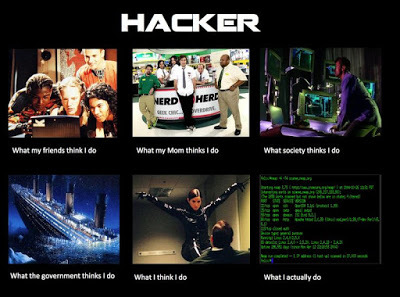 Click to embiggen.
Click to embiggen.
(Remember to say "Enhance!")And a quick note about what I mean by "hacking". I define hacking as "any attempt to subvert the designed purpose for a technology, to use it in a way that was not originally intended." This stereotypically include infosec, that is, breaking and entering computers and networks (and defending against said breaking and entering), but it also includes all manner of opening things up, figuring out how they work, and changing them. If you've ever soldered tiny cargo bays to your quadcopter so you can glitterbomb tourists in downtown Seattle*, you're a hacker.
* No confirmed sightings have been reported, however, if someone were to happen to create such a thing, I am completely not responsible.
I've not played all of these, so my description and categorization of them might be off. A listing with a checkmark means I've played it for at least 5 hours.
And listing of the game does not mean I vouch for it.
One last point: If you want to get the full value from these games, don't resort to walkthroughs! Googling how to do something is useful, because you're learning a skill and applying it to a new problem. But looking up the answer in the back of the book teaches you nothing. If you're "stuck", you should spend at least a few days pondering it — then and only then should you go looking for a hint. And I said *hint*, not walkthrough. Looking up the answer should be a last resort.
Lower Tech, Hacking Themed Games: Look like a hacker, without all the mess!
Look like a hacker, without all the mess!
(Seriously, he's wearing a TIE?!)Most of these require download and install, for various platforms, including Windows, Linux, Android, and iOS. Some are web-based.✔ Digital: A Love Story —
http://scoutshonour.com/digital/
Story-based adventure game that simulates a 1988 computer environment. Solved through email and dialing into BBSes. Loved this game.✔ Uplink —
https://www.introversion.co.uk/uplink/
Simulated hacking environment, which simplifies hacking tools but retains the logic. Awesome game.✔ The Secret World —
http://www.thesecretworld.com/
An MMORPG that requires a hacker brain. Set in a dark version of the modern world of conspiracies, werewolves, and Lovecraftian bliss, it's a regular MMO in many ways: You have a character, get gear, and level up. But to get through the story, you have to solve actual puzzles, including cracking passwords on real (staged) websites. There's Morse Code in the early game that you have to transcribe in order to progress. (Which is harder than it seems if you don't know Morse Code.) As with Telehack, if you want to really learn the hacker mentality, you should solve all puzzles yourself (even if you're stumped) rather than fall back to the wikis and walkthroughs.✔ Hacker Evolution —
http://www.exosyphen.com/page_hackerevolutionuntold.html
A story-based game which, like Digital: A Love Story, immerses you by placing you at a simulated computer console. The story unfolds as you receive emails and take on hacking tasks. Again, the tech is simplified, but you still have to explore and think like a hacker.http://www.hacknet-os.com/
The description says it's a "terminal-based hacking simulator."Hacker Experience —
https://hackerexperience.com/
Virtual simulated hackable world.Hacker Project —
http://www.hacker-project.com/
Story-driven hacking simulator. Web-based.Slavehack —
http://www.slavehack.com/
Web-based hacking simulator.Hacker Forever —
http://www.hackerforever.com/guest.php
Text-based browser and mobile multiplayer hacking simulator.Secret Republic —
http://secretrepublic.net/
Multiplayer hacking simulator.Geek Typer —
http://geektyper.com/
Totally not even a game. But that doesn't matter. Fake it till you make it. Type like a geek!Technical Hacking Games: Typical scene from DEFCON. Learn the skillz to be legit.Most of these technical games are web-based and require no installs. Most are free.✔ TryThis0ne —
Typical scene from DEFCON. Learn the skillz to be legit.Most of these technical games are web-based and require no installs. Most are free.✔ TryThis0ne —
http://www.trythis0ne.com/
Solve real hacking and crypto puzzles. (I'm not sure if it's being maintained; I can't see my score anymore.) This game is awesome.✔ Hack This Site —
https://www.hackthissite.org/
Like TryThis0ne, it's a series of various hacker and crypto puzzles. Also awesome.✔ Telehack —
http://telehack.com/
"Playable archaeology," Telehack simulates the old BBS & pre-web internet, tho it is greatly simplified. Can be played on the web or go old school with telnet. I <3 this game so much.
P.S. I started their wiki, but if you want to learn hacker thinking skills, it's better to learn to play the hard way, through experimentation and reading menus and text files within the game, rather than resorting to the wiki. Figuring things out yourself is part of the hacker mindset, and the true value of this game. I debated putting this under Technical or Low-Tech, but if you play without the Wiki, it's technical enough.✔ Morse Toad (iOS & Android, Free) —
https://itunes.apple.com/us/app/morse-toad/id906586079?mt=8
Learn Morse Code with this cute digital frog.Gruyere —
https://google-gruyere.appspot.com
An app security sandbox and teaching tool by Google.Untrusted —
https://alexnisnevich.github.io/untrusted/
Hack Javascript to win a web based game - cheating is required.CryptoClub —
http://www.cryptoclub.org/
Designed for kids, this game teaches the basics of cryptography and ciphersDamn Vulnerable Web App —
http://www.dvwa.co.uk/
It's a web app. And it's vulnerable. Break it.DC DarkNet —
https://dcdark.net/
An annual crypto/hacker puzzle that coincides with DEFCON. This is a team event.NSA Crypto Challenge —
https://www.guardsupport.com/crypto/index.asp
A weekly cryptanalysis puzzle presented by our surveillance overlords. At the moment, it's just a simple cryptogram like the ones I used to solve in the newspaper. I'm not sure if they get more advanced.XXS- Game —
https://xss-game.appspot.com/
Teaches actual cross-site scripting. Also by Google.Hack This! —
https://www.hackthis.co.uk/
Similar to TryThis0ne and Hack This Site, a series of real hacking challenges.Hax.tor —
http://hax.tor.hu/welcome/
Another one like Hack This Site, a series of challenges.hackxor —
http://hackxor.sourceforge.net/cgi-bin/index.pl
Story-driven series of hacker challenges. Injection —
http://schilcote.itch.io/injection
Write code in Python to solve puzzles.TIS-100 —
http://www.zachtronics.com/tis-100/
Fix corrupted lines of code to learn Assembly! (Download and purchase. Steam and iOS,)Bonus Category: Advanced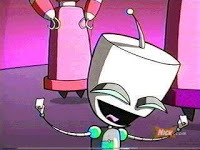 It's not stupid. It's advaaaanced!These aren't technically games, but rather, hacking testbeds that you can set up on your own system and challenge yourself to complete them all.SQLi-Labs 65 SQL Injection Labs —
It's not stupid. It's advaaaanced!These aren't technically games, but rather, hacking testbeds that you can set up on your own system and challenge yourself to complete them all.SQLi-Labs 65 SQL Injection Labs —
https://github.com/Audi-1/sqli-labs
Mess around with SQL Injection to learn how Little Bobby Tables got his Master's Degree.Metasploitable VMs —
https://sourceforge.net/projects/metasploitable/
Metasploit is a hacker tool that assembles an impressive number of scanners and exploits into one powerful machine. Metasploitables are downloadable virtual machines with known vulnerabilities, so you can practice using Metasploit without breaking any laws. The idea is you grab a VM of something like Backtrack or Kali Linux (which come pre-installed with Metasploit and other tools), and a Metasploitable, and pit the two machines against each other, all while learning both offense and defense. I've been thinking about doing this and live streaming my learning process on Twitch, but this is a project I will likely never get around to.Want More? So do I.If these aren't enough, there's a bunch more on this link which I haven't sorted yet: http://hiddenspider.net/links/hacker-games
And once, maybe 15 years ago, I stumbled upon a game where you have to solve various elements hidden within the static HTML, and other 4th-wall breaking puzzles, to advance. I think of it often, and I wish I could remember the name of it so I could find it again! If it still exists. If you know of this game, please tell me in the comments.
I'm highly interested in finding more, especially those teaching real technical skills. Please let me know in the comments, and I'll add them to the list.
 Example of old school hacking,
Example of old school hacking,From the true-to-life 1983 documentary, Hackerman.Back in the day, we had to learn these concepts by word of mouth, by finding a mentor or have hacker friends, or by brute-force figuring it all out our own damned selves. Moreover, computer equipment was expensive, so experimentation was prohibitive for most of us. To learn, we had to crack live systems which were someone else's property, which was both unethical and illegal.
Today, in this magical virtual world built by us old school hackers, we have the luxury not only of wikis, videos, training programs (some at actual colleges!), cheap hardware, and virtual machines to learn on, but we also have a fine collection of hacker games.
There are three categories of hacker games:
Technical games involve the practice of actual coding or cryptanalysis.Hacker logic games which teach hacker thinking processes, but the interface and skill bears little resemblance to real-life hacking. Hacker-motif games full of green-on-black facades, but with little relation to real hacking.This list includes games in the first two categories, that is, games of substance that teach something about real hacking.
 Click to embiggen.
Click to embiggen.(Remember to say "Enhance!")And a quick note about what I mean by "hacking". I define hacking as "any attempt to subvert the designed purpose for a technology, to use it in a way that was not originally intended." This stereotypically include infosec, that is, breaking and entering computers and networks (and defending against said breaking and entering), but it also includes all manner of opening things up, figuring out how they work, and changing them. If you've ever soldered tiny cargo bays to your quadcopter so you can glitterbomb tourists in downtown Seattle*, you're a hacker.
* No confirmed sightings have been reported, however, if someone were to happen to create such a thing, I am completely not responsible.
I've not played all of these, so my description and categorization of them might be off. A listing with a checkmark means I've played it for at least 5 hours.
And listing of the game does not mean I vouch for it.
One last point: If you want to get the full value from these games, don't resort to walkthroughs! Googling how to do something is useful, because you're learning a skill and applying it to a new problem. But looking up the answer in the back of the book teaches you nothing. If you're "stuck", you should spend at least a few days pondering it — then and only then should you go looking for a hint. And I said *hint*, not walkthrough. Looking up the answer should be a last resort.
Lower Tech, Hacking Themed Games:
 Look like a hacker, without all the mess!
Look like a hacker, without all the mess!(Seriously, he's wearing a TIE?!)Most of these require download and install, for various platforms, including Windows, Linux, Android, and iOS. Some are web-based.✔ Digital: A Love Story —
http://scoutshonour.com/digital/
Story-based adventure game that simulates a 1988 computer environment. Solved through email and dialing into BBSes. Loved this game.✔ Uplink —
https://www.introversion.co.uk/uplink/
Simulated hacking environment, which simplifies hacking tools but retains the logic. Awesome game.✔ The Secret World —
http://www.thesecretworld.com/
An MMORPG that requires a hacker brain. Set in a dark version of the modern world of conspiracies, werewolves, and Lovecraftian bliss, it's a regular MMO in many ways: You have a character, get gear, and level up. But to get through the story, you have to solve actual puzzles, including cracking passwords on real (staged) websites. There's Morse Code in the early game that you have to transcribe in order to progress. (Which is harder than it seems if you don't know Morse Code.) As with Telehack, if you want to really learn the hacker mentality, you should solve all puzzles yourself (even if you're stumped) rather than fall back to the wikis and walkthroughs.✔ Hacker Evolution —
http://www.exosyphen.com/page_hackerevolutionuntold.html
A story-based game which, like Digital: A Love Story, immerses you by placing you at a simulated computer console. The story unfolds as you receive emails and take on hacking tasks. Again, the tech is simplified, but you still have to explore and think like a hacker.http://www.hacknet-os.com/
The description says it's a "terminal-based hacking simulator."Hacker Experience —
https://hackerexperience.com/
Virtual simulated hackable world.Hacker Project —
http://www.hacker-project.com/
Story-driven hacking simulator. Web-based.Slavehack —
http://www.slavehack.com/
Web-based hacking simulator.Hacker Forever —
http://www.hackerforever.com/guest.php
Text-based browser and mobile multiplayer hacking simulator.Secret Republic —
http://secretrepublic.net/
Multiplayer hacking simulator.Geek Typer —
http://geektyper.com/
Totally not even a game. But that doesn't matter. Fake it till you make it. Type like a geek!Technical Hacking Games:
 Typical scene from DEFCON. Learn the skillz to be legit.Most of these technical games are web-based and require no installs. Most are free.✔ TryThis0ne —
Typical scene from DEFCON. Learn the skillz to be legit.Most of these technical games are web-based and require no installs. Most are free.✔ TryThis0ne —http://www.trythis0ne.com/
Solve real hacking and crypto puzzles. (I'm not sure if it's being maintained; I can't see my score anymore.) This game is awesome.✔ Hack This Site —
https://www.hackthissite.org/
Like TryThis0ne, it's a series of various hacker and crypto puzzles. Also awesome.✔ Telehack —
http://telehack.com/
"Playable archaeology," Telehack simulates the old BBS & pre-web internet, tho it is greatly simplified. Can be played on the web or go old school with telnet. I <3 this game so much.
P.S. I started their wiki, but if you want to learn hacker thinking skills, it's better to learn to play the hard way, through experimentation and reading menus and text files within the game, rather than resorting to the wiki. Figuring things out yourself is part of the hacker mindset, and the true value of this game. I debated putting this under Technical or Low-Tech, but if you play without the Wiki, it's technical enough.✔ Morse Toad (iOS & Android, Free) —
https://itunes.apple.com/us/app/morse-toad/id906586079?mt=8
Learn Morse Code with this cute digital frog.Gruyere —
https://google-gruyere.appspot.com
An app security sandbox and teaching tool by Google.Untrusted —
https://alexnisnevich.github.io/untrusted/
Hack Javascript to win a web based game - cheating is required.CryptoClub —
http://www.cryptoclub.org/
Designed for kids, this game teaches the basics of cryptography and ciphersDamn Vulnerable Web App —
http://www.dvwa.co.uk/
It's a web app. And it's vulnerable. Break it.DC DarkNet —
https://dcdark.net/
An annual crypto/hacker puzzle that coincides with DEFCON. This is a team event.NSA Crypto Challenge —
https://www.guardsupport.com/crypto/index.asp
A weekly cryptanalysis puzzle presented by our surveillance overlords. At the moment, it's just a simple cryptogram like the ones I used to solve in the newspaper. I'm not sure if they get more advanced.XXS- Game —
https://xss-game.appspot.com/
Teaches actual cross-site scripting. Also by Google.Hack This! —
https://www.hackthis.co.uk/
Similar to TryThis0ne and Hack This Site, a series of real hacking challenges.Hax.tor —
http://hax.tor.hu/welcome/
Another one like Hack This Site, a series of challenges.hackxor —
http://hackxor.sourceforge.net/cgi-bin/index.pl
Story-driven series of hacker challenges. Injection —
http://schilcote.itch.io/injection
Write code in Python to solve puzzles.TIS-100 —
http://www.zachtronics.com/tis-100/
Fix corrupted lines of code to learn Assembly! (Download and purchase. Steam and iOS,)Bonus Category: Advanced
 It's not stupid. It's advaaaanced!These aren't technically games, but rather, hacking testbeds that you can set up on your own system and challenge yourself to complete them all.SQLi-Labs 65 SQL Injection Labs —
It's not stupid. It's advaaaanced!These aren't technically games, but rather, hacking testbeds that you can set up on your own system and challenge yourself to complete them all.SQLi-Labs 65 SQL Injection Labs —https://github.com/Audi-1/sqli-labs
Mess around with SQL Injection to learn how Little Bobby Tables got his Master's Degree.Metasploitable VMs —
https://sourceforge.net/projects/metasploitable/
Metasploit is a hacker tool that assembles an impressive number of scanners and exploits into one powerful machine. Metasploitables are downloadable virtual machines with known vulnerabilities, so you can practice using Metasploit without breaking any laws. The idea is you grab a VM of something like Backtrack or Kali Linux (which come pre-installed with Metasploit and other tools), and a Metasploitable, and pit the two machines against each other, all while learning both offense and defense. I've been thinking about doing this and live streaming my learning process on Twitch, but this is a project I will likely never get around to.Want More? So do I.If these aren't enough, there's a bunch more on this link which I haven't sorted yet: http://hiddenspider.net/links/hacker-games
And once, maybe 15 years ago, I stumbled upon a game where you have to solve various elements hidden within the static HTML, and other 4th-wall breaking puzzles, to advance. I think of it often, and I wish I could remember the name of it so I could find it again! If it still exists. If you know of this game, please tell me in the comments.
I'm highly interested in finding more, especially those teaching real technical skills. Please let me know in the comments, and I'll add them to the list.
Published on September 02, 2016 18:24
March 7, 2016
2015 Accomplishments, 2016 Goals
It's a little late for the traditional writer's New Year post, listing my prior accomplishments and this year's goals, but I figure this way I'm at an advantage. Because I've already accomplished some things this year!
In truth, these posts are more for my own sake than yours. They help me look back and see that I'm actually getting things done, even when in the moment I feel like a miserable failure.
What did I do in 2015? I survived. And for me, for this year, that is quite an accomplishment. 2015 goes on record as being one of the worst years of my life. I left my two life-partners under extremely painful conditions, put myself in the hospital to prevent my suicide, lost my means of support, moved twice in two months, considered my limited career options, and began my recovery from the brand new case of Complex-PTSD that I developed over 7 years in a trauma-inducing environment.
This has left me with an unimaginable level of anxiety, depression, and cognitive impairments which make work extra difficult and discouraging. But I'm recovering, even if slower than I'd like.
So I survived. A great big check off the list!
That said, I didn’t let myself off the hook too much. Even though I didn't accomplish as much as I wanted to (see last year's post), in some ways I accomplished more. And I crossed some significant goals off my list.Sold one short story, Theogenesis Gimmick, which just came out in the Truth Beyond Paradox anthology, which you can purchase at the link.Another of my previously published stories (Meltdown in Freezer Three) became SFWA qualifying (one more till Active Member!)Wrote two posts that were published on the SFWA blog.Had fun speaking on Radcon 6C panels.I was a Norwescon panelist for the first time! Huge bucket list accomplishment.Presented at Sunstone Symposium for the first time. An amazing experience that I would like to repeat.Presented at an International Cultic Studies Association (ICSA) conference on Helping Former Members and Their Families in Santa Fe.My talk was selected to present at the big ICSA conference in Dallas next summer.Created a number of video podcasts analyzing LDS Conference talks, with Jonathan Streeter.In spite of the financial challenges getting there, I helped launch the first year of the DEFCON Biohacking Village, and committed to running their CFP Review in 2016.Attended Rainforest Writer's Retreat.Wrote a large number of Recovering Agency blog posts, including in-depth conference talk analysesParticipated heavily in the outrage against the LDS LGBT Exclusion Policy, and helped comfort (and allowed myself to be comforted) those who were impacted by this decision.Moved to a wonderful new house.Learned an unbelievable amount about life and grew in ways that's really difficult to quantify.Had a number of significant spiritual experiences which are difficult to quantify or even explain.In short, I have no idea how I did all of that, given where I've been. Even though I'm an atheist and a skeptic, I did feel my feet being guided often this year, like I was being placed in the right spaces at the right times, and carried through rough patches that I wasn't sure I could navigate. For this, I am grateful to The Universe for the wonders I've been shown.
Now to 2016!
The future is so uncertain. And because of that uncertainty, these goals are more squishy (less specific) than I prefer. But it's important to write these things down. It helps make them true.
Keep surviving (because some days it’s still hard!)Continue trauma recovery and be happy with where I'm at.Release the Recovering Agency audiobook.Submit more stories, publish more fiction.Write more fiction.Make more income.Successfully run the CFP for the DEFCON Biohacking Village.Speak at Sunstone Symposium on multiple topics.Speak at ICSA Dallas (already accepted!)Panels at NWC and Radcon (already did Radcon!)More blog posts and mind control analysis of LDS Conference Talks.More writing for the SFWA blog.Complete my first paid speaking gig (already accepted!)Publish a few more short ebooks using material I've already written.More guest posts. Stretch goal: maybe even a big one on a well-known and possibly paying blog, like HuffPo, MarySue, Jezebel. Bonus points if it pays!Stretch goal: Write and/or publish a new book, either fiction or nonfiction.
In truth, these posts are more for my own sake than yours. They help me look back and see that I'm actually getting things done, even when in the moment I feel like a miserable failure.
What did I do in 2015? I survived. And for me, for this year, that is quite an accomplishment. 2015 goes on record as being one of the worst years of my life. I left my two life-partners under extremely painful conditions, put myself in the hospital to prevent my suicide, lost my means of support, moved twice in two months, considered my limited career options, and began my recovery from the brand new case of Complex-PTSD that I developed over 7 years in a trauma-inducing environment.
This has left me with an unimaginable level of anxiety, depression, and cognitive impairments which make work extra difficult and discouraging. But I'm recovering, even if slower than I'd like.
So I survived. A great big check off the list!
That said, I didn’t let myself off the hook too much. Even though I didn't accomplish as much as I wanted to (see last year's post), in some ways I accomplished more. And I crossed some significant goals off my list.Sold one short story, Theogenesis Gimmick, which just came out in the Truth Beyond Paradox anthology, which you can purchase at the link.Another of my previously published stories (Meltdown in Freezer Three) became SFWA qualifying (one more till Active Member!)Wrote two posts that were published on the SFWA blog.Had fun speaking on Radcon 6C panels.I was a Norwescon panelist for the first time! Huge bucket list accomplishment.Presented at Sunstone Symposium for the first time. An amazing experience that I would like to repeat.Presented at an International Cultic Studies Association (ICSA) conference on Helping Former Members and Their Families in Santa Fe.My talk was selected to present at the big ICSA conference in Dallas next summer.Created a number of video podcasts analyzing LDS Conference talks, with Jonathan Streeter.In spite of the financial challenges getting there, I helped launch the first year of the DEFCON Biohacking Village, and committed to running their CFP Review in 2016.Attended Rainforest Writer's Retreat.Wrote a large number of Recovering Agency blog posts, including in-depth conference talk analysesParticipated heavily in the outrage against the LDS LGBT Exclusion Policy, and helped comfort (and allowed myself to be comforted) those who were impacted by this decision.Moved to a wonderful new house.Learned an unbelievable amount about life and grew in ways that's really difficult to quantify.Had a number of significant spiritual experiences which are difficult to quantify or even explain.In short, I have no idea how I did all of that, given where I've been. Even though I'm an atheist and a skeptic, I did feel my feet being guided often this year, like I was being placed in the right spaces at the right times, and carried through rough patches that I wasn't sure I could navigate. For this, I am grateful to The Universe for the wonders I've been shown.
Now to 2016!
The future is so uncertain. And because of that uncertainty, these goals are more squishy (less specific) than I prefer. But it's important to write these things down. It helps make them true.
Keep surviving (because some days it’s still hard!)Continue trauma recovery and be happy with where I'm at.Release the Recovering Agency audiobook.Submit more stories, publish more fiction.Write more fiction.Make more income.Successfully run the CFP for the DEFCON Biohacking Village.Speak at Sunstone Symposium on multiple topics.Speak at ICSA Dallas (already accepted!)Panels at NWC and Radcon (already did Radcon!)More blog posts and mind control analysis of LDS Conference Talks.More writing for the SFWA blog.Complete my first paid speaking gig (already accepted!)Publish a few more short ebooks using material I've already written.More guest posts. Stretch goal: maybe even a big one on a well-known and possibly paying blog, like HuffPo, MarySue, Jezebel. Bonus points if it pays!Stretch goal: Write and/or publish a new book, either fiction or nonfiction.
Published on March 07, 2016 14:00
January 26, 2016
Radcon 7 and Norwescon 39 Panel Schedule
It's con season again! I'm so excited to announce my panel schedule for Radcon 7 (Pasco, WA) and Norwescon 39 (Sea-Tac, WA March 24-27). These are some really awesome topics at two of my most favorite cons. I hope to see you there!
Radcon Feb 12-14, 2016The Science of BelievingLots of people believe in things that are, or aren't, real. Not everyone can be right, but everyone thinks they are. As humans, we cling to our convictions as if they were life preservers. Why do we believe things, even when those things are strange or unpopular? And why is it so hard to face being wrong? Science has studied these questions and come up with interesting answers. Come learn about cognitive dissonance theory, cognitive biases, the levers of influence, and mental shortcuts that leave all of us ready to defend our beliefs, sometimes even to the death.Fri 1:45-2:45p – Rm 2205 With: Peter Jones, Rory Miller
Empaths, Synesthetes, & Other Super PowersWhat does science tell us about empathic abilities, synesthesia, and other multi-sensory ways of perceiving - and interacting with - the world? Explore the benefits and challenges experienced by people with these "super powers". Be ready to share. Excellent opportunity for writers crafting a character with one or more of these traits.Fri 5:30-6:30p – Rm 2201With: Alma Alexander, John Alexander, Joyce Reynolds-Ward, Tamra ExcellPolyamory RevivalPolyamory is returning to mainstream consciousness with hit shows like "Polyamory: Married and Dating" on Showtime and feature stories in major news outlets. Learn how polyamory is from times of old, how agriculture and property ownership changed family dynamics, and how certain polyamory models are especially empowering for women. Enjoy the discussion, and walk away with suggested readings to further your knowledge on this fascinating subject.Fri 8:00-9:00p – Rm 2201With: Amanda Baldwin, Bruce Kenoyer II, Craig Jackson, Kevin Wiley, Tamra Excell
50 Shades of ConsentWith the success of books like 50 Shades of Grey, more people than ever are reading about BDSM. But when writing about it, what are some misunderstandings or common errors to avoid? How can writers present it in ways that are safe, sane, and consensual?Fri 9:15-10:15p – Rm 2201With: Amanda Baldwin, Craig Jackson, Peter Jones, Rhiannon Louve
Mind ControlYour villain runs a creepy cult. Your protagonist chooses to remain in an abusive relationship. Your antagonist is a manipulative con artist. A side character is a cult exit counselor. What can transform an intelligent skeptic into a Koolaid-drinker? No magic, truth serums, hypnotic chants, or hand-waving required. Learn the real science behind cults, cons, and coercion for writing realistic mind control.Sat 11:15-12:15a – Rm 2201With: Peter Jones, Rory Miller
Reading: TBA (Theogenesis Gimmick?)Sat 12:30-1p – Rm 2211
Surviving the Post-Apocalypse with DisabilitiesSurvive a post-apocalyptic world with disabilities, both mental and physical, visible and invisible. How do you find food when you have difficulty walking? How do you defend yourself against mutants and rogues while managing PTSD triggers? What will you do without ready access to medications that stave off chronic pain, heart disease, depression, or attention difficulties? Might some disabilities actually become hidden strengths in a world where society has been turned upside down? The panelists are personally experienced with disabilities and will discuss their plans to stay alive through whatever may come. Bring your survival instinct and prepare to prevail.Sat 5:30-6:30p – Rm 2205With: Bill Holden, Eytan Kollin, John McDonald
Diversity in FictionOur world, and our fandom, is expanding. How is a simple SF/F author to keep up? Come talk with a panel of authors who know a thing or two about inclusive writing. Find out how to go about, why to go about it, and when to go about it (Hint: The answer is now!).Sun 10:00-11:00am – Rm 2203With: Alma Alexander, J Tullos Hennig, Kaye Thornbrugh, Peter Jones
Geek Boys vs. the Feminists: An Empathetic Look at Gender in the Geek CommunityThrough the 70s, 80s, and 90s, geeks banded together against an oppressive world that mistreated them and refused to understand them. They created acceptance and friends where previously they had only experienced bullying and ostracism. Now those geeks feel oppressed by a new threat: feminism. Except, the threat isn't new. And it isn't a threat. Male geeks and feminist geeks have more in common than we have different. Let's discuss the intersectionality of the geek cause with the feminist cause, and why inclusion, not busty body armor, should be the common interest that holds the geek community together.Sun 12:30-1:30p – Rm 2201With: J Tullos Hennig, Tim Martin
The Psychology of hackers and gamers; a male/female perspectiveWith the advent of Gamergate and the press a portion of the gaming community has garnered, people are looking at the anti-social aspect of gaming and of hacking. What are these issues, which are real and which are myths? Come join us for what promises to be a lively discussion.Sun 1:45-2:45p – Rm 2207With: L James, Meg James, Peter Jones, Tim Martin
Norwescon March 24-27, 2016The Future of AccessibilityAs much as we might want a future where every injury can be healed, chances are there will always be some things beyond our ability to fix, and situations where tried-and-true will remain the best course. So how might one navigate micro gravity with a leg cast? Would a paraplegic still use a wheelchair, or would exo-skeletons or bionic legs be standard practice? Could robots replace service animals? Let's talk.Thur 9:00-10:00p – Cascade 3&4With: Pat MacEwen (M), Sar Surmick, Dr. Ricky
Invisibile DisabilitiesNot every disability is apparent at a glance, nor is anyone's personal health anyone else's business. From mental illness to chronic disease to a variety of syndromes and impairments too lengthy to list, we'll discuss the difficulties of living with chronic health conditions, the stigmas associated, what progress has (or hasn't) been made in reforming public perception, and strategies on getting other people to mind their own blasted business.Fri 12:00-1:00p – Cascade 10With: Gregory Gadow (M), Cheryce Clayton, Michael 'Tinker' Pearce
Magic RumbleJoin our pros as they each are given a magical system and debate which would reign supreme.Fri 5:00-6:00p – Cascade 3&4With: Grant T. Riddell (M), Peter Orullian, Logan L. Masterson
Creativity & DisabilitiesWhether your problems are physical or psychological, there's no denying that being creative and creating art is difficult to almost impossible when a disability stands in your way. Come learn how different artists and writers work with, past, or through their personal disabilities and limitations to create their art.Fri 6:00-7:00p – Cascade 10With: Kevin Mathews (M), Liv Rainey-Smith, Mark Chapman, Spencer Ellsworth
Consensual Non-Monogamy 101What is consensual non-monogamy? Is it polyamory or swinging or polygamy or relationship anarchy? Why would anyone want more than one partner? What important advice is there for starting out? How do you do you minimize hurt feelings? Can you? How do more conservative family members react to these plural relationships? Should you, shouldn't you? What are the pros and cons?Fri 7:00-8:00p – Evergreen 1&2With: Sar Surmick (M), Sheye Anne Blaze, Wednesday Phoenix, Burton Gamble
A Culture By Any Other NameMany alien cultures bear a strikingly humanized feel to them. Yet, does creating alien cultures too foreign in design make them too hard to be relatable? The pitfalls, pros, and cons of alien cultures is discussed.Sat 12:00-1:00p – Cascade 10With: Jason Bourget (M), Caroline M. Yoachim, Kim Ritchie, Lawrence M. Schoen
Reading: Theogenesis Gimmick (forthcoming in the Truth in Paradox anthology by Onyx Path)A young woman finds out what happens when you click one of those "One Weird Trick!" ads and finds herself awakened to a puzzling world filled with gods and magic.Sat 1:00-1:30p – Cascade 1
Sex & Gender FluidityWe are used to thinking about people in binary terms, but reality is nowhere near that simple. Join our panelists as they discuss what we know -- and do not know -- about the biology of sex and gender.Sat 8:00-9:00p – Cascade 5&6With: Sar Surmick (M), Amber Clark, Wednesday Phoenix, Gregory Gadow
A Thousand WordsLiterature may be the art of beautiful words, but sometimes great writing comes from--or cooperates with--great images. Come hear how writers use drawings, photographs, and maps for inspiration, worldbuilding, character development, and more.Sun 11:00-12:00a – Evergreen 3&4With: Brenda Carre (M), Nina Post, Gregory A. Wilson
The Human Element: PTSD in Science FictionBe it the rigors of space travel or the weight of destroying an entire species, protagonists in science fiction take those fights home with them. Join our panelists as they discuss the nature of post-traumatic stress disorder in science fiction.Sun 3:00-4:00p – Cascade 5&6James C. Glass (M), Sar Surmick, Robert J. Sawyer
Radcon Feb 12-14, 2016The Science of BelievingLots of people believe in things that are, or aren't, real. Not everyone can be right, but everyone thinks they are. As humans, we cling to our convictions as if they were life preservers. Why do we believe things, even when those things are strange or unpopular? And why is it so hard to face being wrong? Science has studied these questions and come up with interesting answers. Come learn about cognitive dissonance theory, cognitive biases, the levers of influence, and mental shortcuts that leave all of us ready to defend our beliefs, sometimes even to the death.Fri 1:45-2:45p – Rm 2205 With: Peter Jones, Rory Miller
Empaths, Synesthetes, & Other Super PowersWhat does science tell us about empathic abilities, synesthesia, and other multi-sensory ways of perceiving - and interacting with - the world? Explore the benefits and challenges experienced by people with these "super powers". Be ready to share. Excellent opportunity for writers crafting a character with one or more of these traits.Fri 5:30-6:30p – Rm 2201With: Alma Alexander, John Alexander, Joyce Reynolds-Ward, Tamra ExcellPolyamory RevivalPolyamory is returning to mainstream consciousness with hit shows like "Polyamory: Married and Dating" on Showtime and feature stories in major news outlets. Learn how polyamory is from times of old, how agriculture and property ownership changed family dynamics, and how certain polyamory models are especially empowering for women. Enjoy the discussion, and walk away with suggested readings to further your knowledge on this fascinating subject.Fri 8:00-9:00p – Rm 2201With: Amanda Baldwin, Bruce Kenoyer II, Craig Jackson, Kevin Wiley, Tamra Excell
50 Shades of ConsentWith the success of books like 50 Shades of Grey, more people than ever are reading about BDSM. But when writing about it, what are some misunderstandings or common errors to avoid? How can writers present it in ways that are safe, sane, and consensual?Fri 9:15-10:15p – Rm 2201With: Amanda Baldwin, Craig Jackson, Peter Jones, Rhiannon Louve
Mind ControlYour villain runs a creepy cult. Your protagonist chooses to remain in an abusive relationship. Your antagonist is a manipulative con artist. A side character is a cult exit counselor. What can transform an intelligent skeptic into a Koolaid-drinker? No magic, truth serums, hypnotic chants, or hand-waving required. Learn the real science behind cults, cons, and coercion for writing realistic mind control.Sat 11:15-12:15a – Rm 2201With: Peter Jones, Rory Miller
Reading: TBA (Theogenesis Gimmick?)Sat 12:30-1p – Rm 2211
Surviving the Post-Apocalypse with DisabilitiesSurvive a post-apocalyptic world with disabilities, both mental and physical, visible and invisible. How do you find food when you have difficulty walking? How do you defend yourself against mutants and rogues while managing PTSD triggers? What will you do without ready access to medications that stave off chronic pain, heart disease, depression, or attention difficulties? Might some disabilities actually become hidden strengths in a world where society has been turned upside down? The panelists are personally experienced with disabilities and will discuss their plans to stay alive through whatever may come. Bring your survival instinct and prepare to prevail.Sat 5:30-6:30p – Rm 2205With: Bill Holden, Eytan Kollin, John McDonald
Diversity in FictionOur world, and our fandom, is expanding. How is a simple SF/F author to keep up? Come talk with a panel of authors who know a thing or two about inclusive writing. Find out how to go about, why to go about it, and when to go about it (Hint: The answer is now!).Sun 10:00-11:00am – Rm 2203With: Alma Alexander, J Tullos Hennig, Kaye Thornbrugh, Peter Jones
Geek Boys vs. the Feminists: An Empathetic Look at Gender in the Geek CommunityThrough the 70s, 80s, and 90s, geeks banded together against an oppressive world that mistreated them and refused to understand them. They created acceptance and friends where previously they had only experienced bullying and ostracism. Now those geeks feel oppressed by a new threat: feminism. Except, the threat isn't new. And it isn't a threat. Male geeks and feminist geeks have more in common than we have different. Let's discuss the intersectionality of the geek cause with the feminist cause, and why inclusion, not busty body armor, should be the common interest that holds the geek community together.Sun 12:30-1:30p – Rm 2201With: J Tullos Hennig, Tim Martin
The Psychology of hackers and gamers; a male/female perspectiveWith the advent of Gamergate and the press a portion of the gaming community has garnered, people are looking at the anti-social aspect of gaming and of hacking. What are these issues, which are real and which are myths? Come join us for what promises to be a lively discussion.Sun 1:45-2:45p – Rm 2207With: L James, Meg James, Peter Jones, Tim Martin
Norwescon March 24-27, 2016The Future of AccessibilityAs much as we might want a future where every injury can be healed, chances are there will always be some things beyond our ability to fix, and situations where tried-and-true will remain the best course. So how might one navigate micro gravity with a leg cast? Would a paraplegic still use a wheelchair, or would exo-skeletons or bionic legs be standard practice? Could robots replace service animals? Let's talk.Thur 9:00-10:00p – Cascade 3&4With: Pat MacEwen (M), Sar Surmick, Dr. Ricky
Invisibile DisabilitiesNot every disability is apparent at a glance, nor is anyone's personal health anyone else's business. From mental illness to chronic disease to a variety of syndromes and impairments too lengthy to list, we'll discuss the difficulties of living with chronic health conditions, the stigmas associated, what progress has (or hasn't) been made in reforming public perception, and strategies on getting other people to mind their own blasted business.Fri 12:00-1:00p – Cascade 10With: Gregory Gadow (M), Cheryce Clayton, Michael 'Tinker' Pearce
Magic RumbleJoin our pros as they each are given a magical system and debate which would reign supreme.Fri 5:00-6:00p – Cascade 3&4With: Grant T. Riddell (M), Peter Orullian, Logan L. Masterson
Creativity & DisabilitiesWhether your problems are physical or psychological, there's no denying that being creative and creating art is difficult to almost impossible when a disability stands in your way. Come learn how different artists and writers work with, past, or through their personal disabilities and limitations to create their art.Fri 6:00-7:00p – Cascade 10With: Kevin Mathews (M), Liv Rainey-Smith, Mark Chapman, Spencer Ellsworth
Consensual Non-Monogamy 101What is consensual non-monogamy? Is it polyamory or swinging or polygamy or relationship anarchy? Why would anyone want more than one partner? What important advice is there for starting out? How do you do you minimize hurt feelings? Can you? How do more conservative family members react to these plural relationships? Should you, shouldn't you? What are the pros and cons?Fri 7:00-8:00p – Evergreen 1&2With: Sar Surmick (M), Sheye Anne Blaze, Wednesday Phoenix, Burton Gamble
A Culture By Any Other NameMany alien cultures bear a strikingly humanized feel to them. Yet, does creating alien cultures too foreign in design make them too hard to be relatable? The pitfalls, pros, and cons of alien cultures is discussed.Sat 12:00-1:00p – Cascade 10With: Jason Bourget (M), Caroline M. Yoachim, Kim Ritchie, Lawrence M. Schoen
Reading: Theogenesis Gimmick (forthcoming in the Truth in Paradox anthology by Onyx Path)A young woman finds out what happens when you click one of those "One Weird Trick!" ads and finds herself awakened to a puzzling world filled with gods and magic.Sat 1:00-1:30p – Cascade 1
Sex & Gender FluidityWe are used to thinking about people in binary terms, but reality is nowhere near that simple. Join our panelists as they discuss what we know -- and do not know -- about the biology of sex and gender.Sat 8:00-9:00p – Cascade 5&6With: Sar Surmick (M), Amber Clark, Wednesday Phoenix, Gregory Gadow
A Thousand WordsLiterature may be the art of beautiful words, but sometimes great writing comes from--or cooperates with--great images. Come hear how writers use drawings, photographs, and maps for inspiration, worldbuilding, character development, and more.Sun 11:00-12:00a – Evergreen 3&4With: Brenda Carre (M), Nina Post, Gregory A. Wilson
The Human Element: PTSD in Science FictionBe it the rigors of space travel or the weight of destroying an entire species, protagonists in science fiction take those fights home with them. Join our panelists as they discuss the nature of post-traumatic stress disorder in science fiction.Sun 3:00-4:00p – Cascade 5&6James C. Glass (M), Sar Surmick, Robert J. Sawyer
Published on January 26, 2016 14:19
August 18, 2015
DEFCON 23: Putting the Confidence in "Con"
I left DEFCON last year wondering how I could give back. This year, I realized that I've always been giving back.
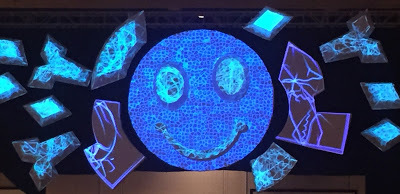
I almost skipped DEFCON 23. I lost my means of support in May and my savings is running out. The wise thing would have been to stay home. But I justified how I should throw caution to the wind and find the means to go, and I'm so glad I did. DEFCON never fails to disappoint.
Highlights of my DC23 experience: Brought my own phonograph so I could listen to the badgeHelped run the first-year Biohacking VillageSocialized and made new friends and contactsNetworked and pursued job opportunities (this is how I justified the expense)Enjoyed Queercon 12 events and Queercon's sweet badgeAttended the Telephreak party
But the real highlight wasn't any single event; it was something I carried within me through the series of mind-blowing events that made up DEFCON. It really is all about "what you bring to the party." This is such a huge ridiculous lifecoachy cliché… but you don't really grok these tidbits of wisdom until you've experienced certain angles of life and succeeded at taking the right kinds of risks.
For the last few years, I've been developing social confidence. These are skills I've been trying to learn my whole life, but confidence cannot be taught. It can only be learned. There is no secret recipe, and describing my path to this point would fill it's own blog post. But I can distill the core of what I've learned into simple phrase:
You have something to give.
Once you grok this concept, not just on the surface, but on a deep level, it becomes easily to have faith in your strengths and talents. Then the social confidence just follows. I've come a long way since my first DEFCON in the Riv eight years ago (technically the linked write-up is from my second DEFCON), from my "I'm not worthy to be here!" outlook to the spunk and swagger I have today.
I couldn't talk myself out of the fear of being a poser. I had to learn by doing.
One way to convince yourself that you have something to give is to start giving. Take a leap of faith and do things, make stuff, help people. Don't be down on yourself about how you're not smart enough or your efforts aren't good enough. You'd be amazed at how little you have to do or know to get involved. It's a lot of work to do all the cool things that happen in the world, and as I learned, even contributing a couple of hours of menial labor is far more than most people contribute, and even small gestures will make you stand out and open up new opportunities for learning, growth, and connection.
My big project this year, which took very little time or effort, was helping put on the first Biohacking Village.

Similar to computer hacking, "biohacking" is subverting biology to do something other than what was originally "intended." Which is a pretty broad umbrella that includes implantables, biomolecular computing, bioinformatics, gene hacking, nootropics, transhumanism, medical device hacking, sense hacking, neurodiversity, bioethics, and lots more.
And a "village" at DEFCON is an area set aside for a focused topic, where attendees can hear talks and get hands on. Other villages include the Lockpicking Village, Tamper Evident Village, Social Engineering Village, Hardware Hacking Village, etc.
 Example village: Car hacking!
Example village: Car hacking!(Near Biohacking Village)Why is biohacking important and why does it belong at DEFCON? Because biohacking is now where the Homebrew Computer Club was in 1975. Right now the future Steve Jobs and Bill Gates of the biotech world are sitting in their garages splicing genes to make bioluminescent e. coli. They are designing injectable RFID chips. They are building prosthetics with 3D printers. They are trying to clone dinosaurs. In 10, 20, or 30 years, this question will sound as ignorant as, "What's the point in building an Altair 8800? It doesn't even do anything." (Historical fact: It didn't even do anything.)
Biohacking belongs at DEFCON for three reasons:The intersection of computer tech and biotech is pretty vast. And that intersection will grow. Securing biotech ought to be a huge concern to hackers of all kinds. There are of course other cons dedicated to biohacking, like Body Hax Con. But they're brand new. We've learned a lot about technology ethics in the last 40 years. Youngsters who are starting biotech exclusively from the biology side really need our guidance so they don't accidentally destroy all of mankind with their magical wizard powers.
 Awkward Diagram
Awkward DiagramNote: It's not just "computer hacking"
DEFCON is traditionally about all kinds of hacking on electrons.I myself am not a biohacker (unless you count the work I've done to reverse engineer mind control). I just have a strong interest in what is going on in the field. But that's my point – don't disqualify yourself because you haven't done the thing or don't know the stuff. You still have something to give.
Even with my lack of experience, I contributed by giving input on the BHV mailing list over the year, and at DEFCON, and I stood at the booth for a few hours answering low-level questions for the hundreds of people that stopped by. I don't have to grow human ears on mice or give myself nightvision to contribute much-needed efforts towards bringing people together and getting DEFCON attendees excited about biohacking.
Presence can earn some pretty sweet cred. Fangirl or fanboy enthusiasm can itself be a superpower.
The village was a huge success. We just had the one small booth in the contest room, a handful of demos, and nine talks. Oh, and a pretty sweet logo! WTF on that amazing logo?? It was enough to get the word out and get tons of people introduced to and excited about this grand new thing called biohacking.
One of the most frequently asked questions I got at the booth was, "What about implants?" We had one speaker, Alex Smith, who performed an RFID implant right at our table. I caught it on video:
And as an example of where tech meets bio, Scott Novich had his vibrovest there. It takes sound input and converts it to tactile sensations along the torso, with the primary purpose of helping deaf people sense sound kinetically. But it could be put to many other sense-hacking uses, for instance, it could transform other information, like direction, weather patterns, or wifi signal strength, into a tactile sense. Our brains are extremely robust and can wire to understand any sense we give it, so we're just dipping our toes into the ocean of potential with these kinds of devices.
We've got huge plans for the village for next year, including the possibility of creating a living badge. I'll be even more involved, heading up the CFP process to select speakers for talks, demos, and labs. (Just so you know who to buy beer for. (Just kidding bribery is bad kids! (Plus I don't like beer, but I do like Chartreuse…))) I'm really excited.
 Stay safe, kids!I missed all but three talks. In the beginning, I caught one on hiring in infosec, and two biohacking talks at the end. (All Biohacking Village talks will be available on video in the near future.) This was somewhat due to the massive crowding on the Paris side of the venue, and somewhat due to a conscious decision to watch the talks online later so I could spend more time doing what can only be done at DEFCON: Socializing.
Stay safe, kids!I missed all but three talks. In the beginning, I caught one on hiring in infosec, and two biohacking talks at the end. (All Biohacking Village talks will be available on video in the near future.) This was somewhat due to the massive crowding on the Paris side of the venue, and somewhat due to a conscious decision to watch the talks online later so I could spend more time doing what can only be done at DEFCON: Socializing.Since I avoided the Paris-side, I missed seeing a lot of familiar faces, which, in addition to the new venue, made it kind of weirdly not-DEFCON. But I have no regrets.
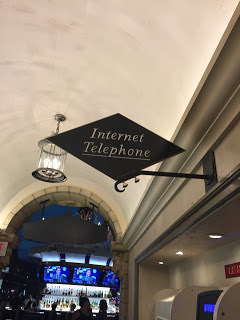 My complete review of the new venue:
My complete review of the new venue:Paris came equipped with these sweet internet telephones!Troubleshooting The Broken Meritocracy
In my writeup last year, I promised I'd do a separate writeup of the problems that occurred during the Diversity Panel at DC22. I still have the notes for this post, and I even had a very long and productive email conversation with Priest, who was involved in that panel. Because of the huge upheavals in my life this year, I never got around to writing it, which is too bad, because it's probably too late now. That ship has perhaps sailed. However, the entire experience was illustrative of many of the dynamics in our community, of how well-meaning attempts to help women and minorities to feel welcome and safe can backfire, and some of the reasons why. Priest was really cool about everything, open to listening, and sincerely concerned. I think our community has much to learn from all aspects of the experience.
I may still do that writeup, even though at this point, the whole thing might be moot.
My own personal experience of being a woman at DEFCON this year was awesome. Much improved. I personally had no issues. I felt treated well and respected for my intelligence. I never once felt like I had to prove that I belonged there, even to total strangers I had just met at parties. I never felt mansplained to. Flirtation occurred, but in the right venues (parties) and with an air of respect and equal footing, and not to the exclusion of interest in my actual intelligence. A few men expressed concern and awareness of the difficulties I might be facing, saying things like, "I hope you've been treated okay at this con."
Education campaigns and social justice activism clearly seem to be helping.
 Equality, at long last!Huge kudos to Dark Tangent, and to specific Goons I've spoken with who have expressed concern and willingness to change DEFCON for the better. (I would name them but I'm not sure they want to be named.) I've said all along that, unlike certain other cons *cough*PAX*cough* DEFCON has handled the various controversies incredibly well: Rather than making public shows of issues and getting defensive, they've been receptive to complaints and even proactively reached out for feedback. All conversations about the incidents occur in private, and then the following year, those incidents do not recur. No public drama, no firestorms, no hurtful pseudo-apologies.
Equality, at long last!Huge kudos to Dark Tangent, and to specific Goons I've spoken with who have expressed concern and willingness to change DEFCON for the better. (I would name them but I'm not sure they want to be named.) I've said all along that, unlike certain other cons *cough*PAX*cough* DEFCON has handled the various controversies incredibly well: Rather than making public shows of issues and getting defensive, they've been receptive to complaints and even proactively reached out for feedback. All conversations about the incidents occur in private, and then the following year, those incidents do not recur. No public drama, no firestorms, no hurtful pseudo-apologies. That said, this was just my own experience, my perception of a general trend towards improvement, and that doesn't necessarily mean everything is fixed. If you did have an issue, I encourage you to reach out to DEFCON Goons privately and let them know. They really will handle it well. If they are ignorant of why a thing is an issue, they will listen. It may take some patience in explaining it to them, but they honestly and legit want to know how to improve. And reach out to me personally if you're uncertain. I'm not a goon, but I'll encourage and support you and give you advice. I know how scary it can be.
At least through my little lens, it feels like DEFCON culture is improving in how it treats women, and hopefully in how it treats other marginalized classes. Way to go and more of this!
<soapbox>
I did have one quibble however on the social justice front: just one more little way our community can improve. This is a cultural issue, involving a word I heard over and over, coming from a wide variety of really nice and smart people. I winced each time I heard it, but I didn't have the courage to argue with anyone. (The "You're too sensitive!" backlash does have a cost, which I am sometimes unwilling to pay.) I realize it's a bit passive aggressive to mention it here without saying it to people's faces, especially since I personally know some of the people who used it, but I'm a big chicken IRL. So here goes:
This word is " retarded " or variants thereof. I know it's a cool edgy way to talk about how unintelligent something or someone is, but those who use it do not understand its history or realize that the person they're talking to (me) falls into a class that is, to this day, marginalized, bullied, and institutionally abused through the use of this word. I have Asperger's, which is a type of autism. And before you say, "Well, we don't mean that kind of autism!"... just stop. You're digging your hole deeper. You're smart. Go educate yourself. If you don't, you basically sound like this guy, only about autism rather than computers. I've got some links in this paragraph, and you know how google works. Or ask me. (I don't want to make this post too long explaining on this rant.) There are lots of sources of why this word is hurtful. And FYI? Yes, I do feel hurt when I hear this word, and no, I'm not being too sensitive. And no, my request is not censorship.
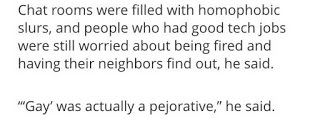 Ancient history, at this point,
Ancient history, at this point,according to the Washington Post.We're not 14 anymore and this isn't IRC. We can prove our intelligence by the words we say and the things we do, not by using slurs to put others down. We've ended the flippant use of the word "gay" at DEFCON as a pejorative. Now can we stop saying the "R" word?
</soapbox>
DEFCON Badge, Badge, Badge, Badge MUSHROOM MUSHROOM!
I didn't get very involved in the badge challenge this year. I did, however, bring a record player. I'd seen on Twitter Wednesday that the badge was a record (yes, a record), and my housemate happened to have a portable USB-compatible phonograph, so I brought it on my Thursday morning flight. This made a wonderful icebreaker for me on the first day. (After that, no one cared.) Using my phonograph, I was able to upload the audio to YouTube for your convenience, so you can listen right now. (Side B's track was a recording of the ever-hot DualCore singing Hack All the Things)
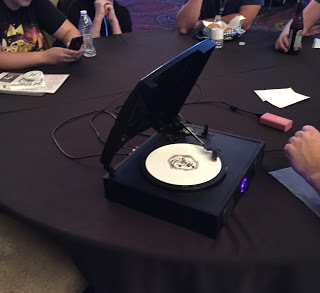 It's just like streaming.. only.. more groovy.A brief mention of the ultra-hot über badge this year. Rather than re-describe it, I'll link to someone else's description. I grew up in Richland, WA, with a chem engineer dad who worked for a government contractor, and I worked as an intern on the Hanford Nuclear Reservation, and my favorite con (DEFCON is my second) is RadCon, so all this radiation stuff is basically comfort food for me.
It's just like streaming.. only.. more groovy.A brief mention of the ultra-hot über badge this year. Rather than re-describe it, I'll link to someone else's description. I grew up in Richland, WA, with a chem engineer dad who worked for a government contractor, and I worked as an intern on the Hanford Nuclear Reservation, and my favorite con (DEFCON is my second) is RadCon, so all this radiation stuff is basically comfort food for me.  Photo credit: Japan Times
Photo credit: Japan TimesBecause I fail at taking pix when I'm chatting with LoST.Warm, so warm.
I fiddled with the badge challenge as I had time Thursday, but I really didn't want to go too far down the rabbit trail, because I needed to focus on being social. Solving things and chatting confidently with people about a wide range of topics takes a different spline set, so I resisted the call.
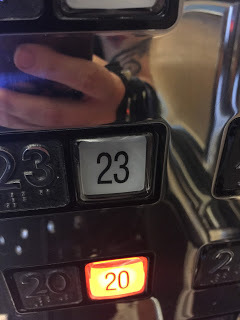 I'm pretty sure this has something to do with the badge challenge.But if you'd like to see the solution, here is a write up. And another. (There was a wiki but it appears to have been deleted.)
I'm pretty sure this has something to do with the badge challenge.But if you'd like to see the solution, here is a write up. And another. (There was a wiki but it appears to have been deleted.) 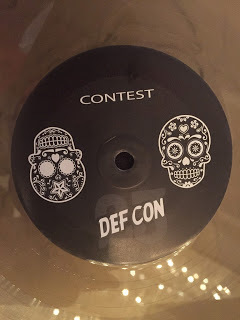
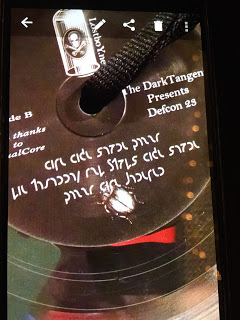

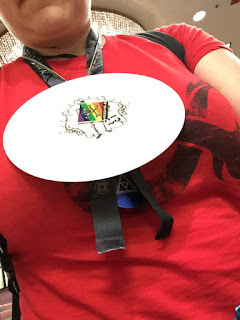 Queue the Flava Flave jokes.A lot of people complained about the unwieldiness of this year's badge, but I enjoyed hacking the lanyard, and eventually eschewing the lanyard altogether. I also enjoyed seeing other people's badge hacks. And counterfeit badges were hilarious, like the guy with a paper plate with "HUMAN" written on it. Kids these days don't know what old tech looks like, and this record gave them some exposure to the ancient roots of the hacking community...
Queue the Flava Flave jokes.A lot of people complained about the unwieldiness of this year's badge, but I enjoyed hacking the lanyard, and eventually eschewing the lanyard altogether. I also enjoyed seeing other people's badge hacks. And counterfeit badges were hilarious, like the guy with a paper plate with "HUMAN" written on it. Kids these days don't know what old tech looks like, and this record gave them some exposure to the ancient roots of the hacking community...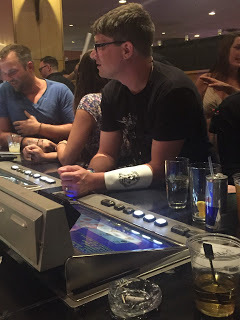 The famed "gauntlet hack"
The famed "gauntlet hack"(spotted at barcon)...Like the Telephreak Badge
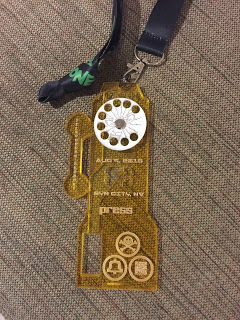 Q: How do you tell a phreak?
Q: How do you tell a phreak?A: By all the telepwns!I think at this point, I can officially qualify as a DEFCON Badge Fangirl (is there a badge for that?)
Last year I scored a sweet Telephreak pager,
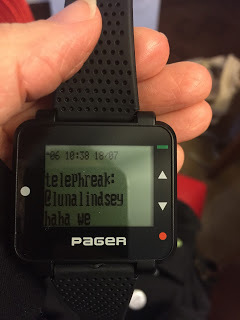

...and then wrote about it, which means this year I scored a l33t Telephreak press badge. This orange piece of plastic has little plastic coins in denominations of 25, 10, and 5, and a working rotary dial. To those kids who didn't know what a "record" was, you might also love to learn that this badge is fashioned after an archaic device we once called a "payphone," into which one placed quarters so we could "call someone who cares," as the flamers put it. Now get off my lawn.
This plastic replica represents a significant piece of hacker history, so if you want to be truly l33t, go google Captain Crunch with your advanced "search engine."
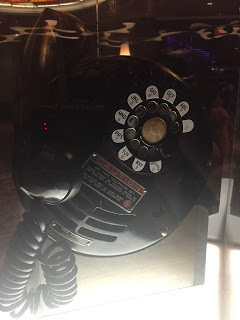 Authentic voice-only "phone"
Authentic voice-only "phone" used by nomads in prehistoric times.It would be truly sweet if someone could hack this badge into a working phone, but I settled for my own little badge hack. The manufacturer's plan for the coin drawer was a literal gaping hole, through which the coins would simply fall out under the force of gravity. Hard to make money from a payphone with that design! Ever one to defy "laws" like "gravity," I violated the EULA and improved on the original by adding a door using found materials. I even added an authentic easy-to-pick tubular lock, just like a real payphone! (And just about as secure!)
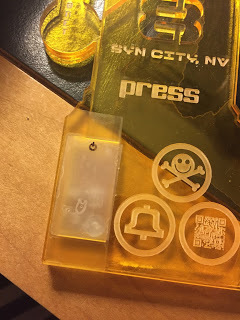
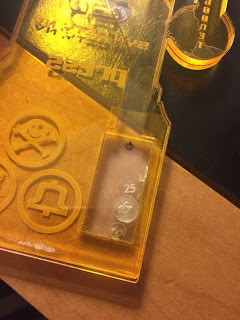 "Press" *69Sadly, this did not protect my coins well enough, because both dimes got shaken out in the flight home, and they seem to be lost forever. Lessons learned.
"Press" *69Sadly, this did not protect my coins well enough, because both dimes got shaken out in the flight home, and they seem to be lost forever. Lessons learned.The Telephreak pager also operated this year, and for some reason, the battery seemed to have more life over last year, even though, to my knowledge, I received no firmware updates. Not really sure what was up with that insane magic!
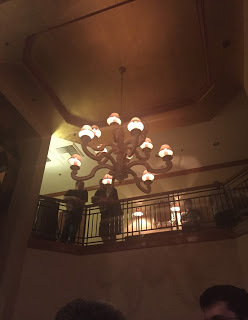 Swanky.
Swanky.(Faces digitally blurred to protect the "innocent.")Telephreak party was pretty sweet, as usual. I listened to a couple of lightning talks, but mostly I wanted to talk to people, and talk I did. I met new people, reacquainted myself with people I already knew, and even got a little emotional support from someone I'd met last year. (Thanks, man!) The Telephreak party is a great environment for me, because I want just enough alcohol to make me socially fluid, and I want relatively quiet rooms packed with cool, intelligent, talkative people who want to listen to me rant on esoteric topics. Telephreak provides all of this in a swanky environment that makes me feel like I paid a million bucks to be there.
Queercon 12

Thanks to the larger DEFCON venue, Queercon made it's way back onsite, with a constant presence during the whole con. In addition to their kickin' Friday night pool party with the bright lights and body-throbbing music we've come to expect, they had a suite in the Jubilee tower, for packed afternoon mixer parties, and a Saturday night low-key sit-and-chat party. The rest of the time, the suite was open as a safe space to relax and chill out for a little peace and quiet. They provided free coffee and breakfast munchies daily.
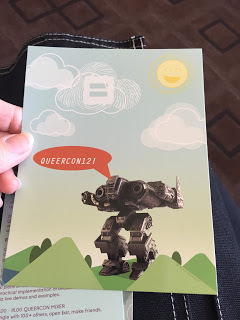
I kind of wish there'd been more women and gender non-binaries like myself there, but I've got no problem with hanging out with cis gay men. They're so adorbs. I took refuge in there a couple of times when I needed an introvert's recharge, and I enjoyed the parties as well.
They also had a few talks in the suite, though I only attended one. Which brings us to the Queercon badge…
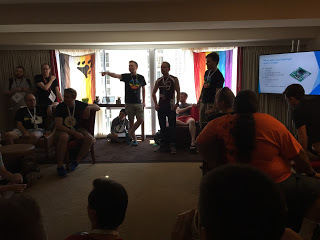 Badges? We don't need no stinkin...
Badges? We don't need no stinkin...Ok yeah, this joke is too old.…did I mention I'm a badge fangirl?
So first, I had a badge reserved for me because of my writeup last year. Honestly, one of the reasons I decided to splurge and go to DEFCON against the wishes of the financial advisor who lives in my brain was the personal invite from both Queercon and Telephreak prior to the con, and their mutual expressed disappointment that I could not make it. Never underestimate how small gestures of inclusion can make people feel appreciated and important, and again, never underestimate the value of your contributions, however small, to help build community. These actions and reactions create a virtuous cycle that uplifts everyone involved.
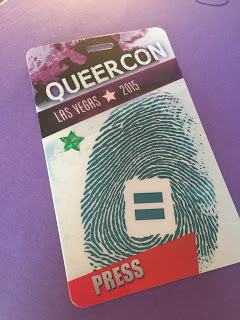 "Press" any key to continue.
"Press" any key to continue.As long as it's L, G, B, T, Q, A, I, or +!At any case, I had a personal invite to the Queercon kickoff party Thursday night. I arrived at their offsite location at Palms Place, to discover I was not only on the invite list, but as a VIP! Flattered and honored. The kickoff party was a great way to spend my first night at DEFCON, with good drinks, friends, and conversations with new folk in a beautiful setting.
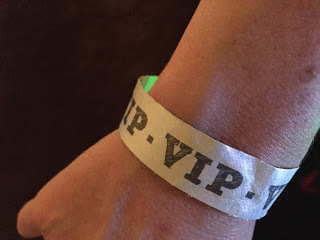 Pix. Cos it happened.And the badge. Oh this badge. Last year's QC badge astounded as a feat of modern engineering, but this year's topped even that!
Pix. Cos it happened.And the badge. Oh this badge. Last year's QC badge astounded as a feat of modern engineering, but this year's topped even that! 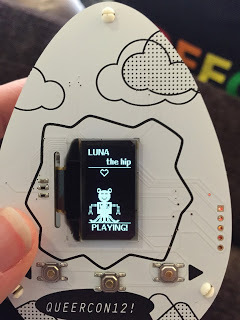
As you can see, it is an egg-shaped pair of circuit boards, separated by spacers, with a living digital creature dancing on a 0.96" OLED display. If that's not colorful enough for you, there are five multicolored LEDs around the inside, to generate eye-dazzling effects at various times.
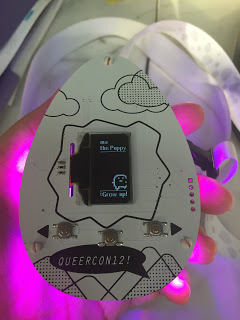 How is babby formed?The creature on the badge starts out as a "baby," an adorable blob that dances and plays. (The baby grows up after a rumored 12-hours.) Three buttons allow you to cycle through the functions, which include, "Play," "Set Name," and "ASL?"
How is babby formed?The creature on the badge starts out as a "baby," an adorable blob that dances and plays. (The baby grows up after a rumored 12-hours.) Three buttons allow you to cycle through the functions, which include, "Play," "Set Name," and "ASL?"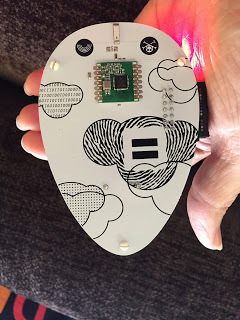 Also works in "upside down" mode,
Also works in "upside down" mode,shown here.*
(*image not to scale)The badge communicates with other badges via a RF chip which is an improvement on last year's IR interface. Line-of-sight interactions were difficult previously, and in contrast, this badge picked up easily on the presence of other badges.
In the spirit of "badge sex" featured in previous badges, the "Play" function sets off all nearby badges, forcing them to also "play," causing their lights to blink and their character to dance around. Babies could not play with adults, thus preventing any interactions of questionable legality.
By day two, all of our badges had grown up. Each badge had been programmed with six different heads, torsos, and feet, which could be combined in 80 different character designs. Mine was a octo-robo-bear, with lovely wonderful tentacles for feet. They couldn't have picked a better character to give me.
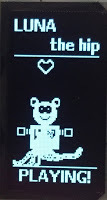
The Über Badges (there were 13), were black and had their own unique characters not built from the parts of other monsters.
We could "befriend" one another, which involved clicking "Befriend" at the same time another person did so. We discovered through trial and error that friending could only happen one-on-one.. You could non-consensually play with a large group of people, but the more intimate function of friending was rather mononormative.
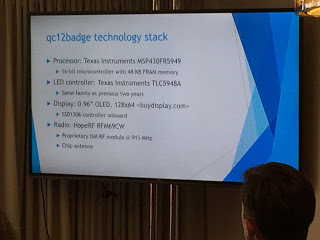 The devilish plans
The devilish plansof the mononormative agenda.The "ASL?" feature allowed you to look at your stats: How many other badges had you seen, how many übers? How many people had you befriended? Who were your faves (which badges did you hang out with the most?) And which achievements had you unlocked?
Yes, there were achievements, for things like attending specific events, making a certain number of friends, and sleeping with your Fave. (This achievement involves putting your badge into sleep mode at the same time as your fave, in proximity of your fave, and leaving it in sleep mode for 30 minutes. There was some debate at the badge talk about whether 30 minutes is long enough… as the only vocal woman present, I disagreed. A half-hour is definitely not long enough.)
Some of the features were a little buggy, and I didn't get credit for a few things, like for all the über badges I saw, or for going to the badge talk. Since I'm an achievement completionist, it bugs me a little bit (get it, bugs?) but that's my own psychosis, so I'll deal with it. Probably through medications and therapy.
 Cables and wires and stuff.
Cables and wires and stuff.They hold in the magic "smoke."
See how the display has come loose?
The fix is described below.
(Hint: Glue)One achievement I missed due to my own failure, so I deserve it. Two of each character-combo existed, leading to the achievements "Find your twin" and "Befriend your twin." I apparently was in the same room with my twin at one of the packed mixers, but I did not seek them out.
The badge came in a sweet box with l33t stickers and a lanyard and a pin. (I used the pin to hack my DEFCON badge to make it a wearable technology.) Total cost of the badge, including the swag that went with the badge, but not including labor to design and build it, was over $100 per badge. There were 175 badges created, but one was destroyed beyond repair, so only 174 are in circulation.
It is QC's intent to keep badges scarce because clearly they understand psychology, that the rarity of a thing builds interest. This is a true fact of mind control and persuasion of the masses. So good social hack, guys! :D
Another feature is the "flag" which makes all the lights go all rainbow. There are a number of big gay flags, including bi, trans, ally, leather, and bear. I had a hard time choosing between bi and trans, but it turns out they're almost the same colorset. How very convenient for me.
The badge does have a cheat mode, and here is the secret: Go to "Set Name," and choose it.Hold down the left button until the lights blink and it says, "Enter a cheat code, you wascally wabbit."Whatever you do, do not hold down the middle button instead of the left button. It turns on one of the green LEDs and locks up the device and summons a demon. (The demon is invisible.)Enter the cheat code.Hold down the middle button until pretty lights flash. If red lights flash, you have entered an invalid cheat code. (This also unsummons the demon.)
Cheat codes include: "R2L" and "L2R" - mirrors and unmirrors the screen"SMILE" and "FROWN" - makes you happy / sad"BABY" and "MOMMA" - turns you into a baby / enables "grow up""BANNER" - enables flags and removes flag cooldown starting with the next use"FFS" - enables flags"BANDW" and "WANDB" - inverts the screen colors"TITULAR" - enables title selection. Go to the ASL screen, and you should be able to choose from your unlocked titles."WOOF" and "MEOW" - enables/disables "puppy mode"
If you have one of these badges, protip: The display can come loose. Just glue it down. You will also want to add some dollups of glue to the corners (as shown) to prevent these from catching, breaking, and damaging the screen itself.
 Glue that shit down.Official full technical details on the badge here.
Glue that shit down.Official full technical details on the badge here. Queercon 12 Pool Party
Queercon 12 Pool PartyStill the best party at DEFCONOverall, I've got to hand it to Queercon. When I first started coming to DEFCON eight years ago, "gay" was still a common pejorative in the hacker/geek community, and homophobia still ran rampant. Queercon established the LGBT presence within the hacker community as a cool crowd that people wanted to be associated with in a positive way. Moreover, they created a space that was safe, not just for LGBT folks, but allies and others. Rather than directly confront the homophobia, the QC folks stepped in and changed the stigma. This is an effective persuasion strategy, one which I think other marginalized groups ought to emulate.
 Couldn't have said it better myself.Social Justice Hacker Slacker
Couldn't have said it better myself.Social Justice Hacker SlackerI say the above with some hypocrisy, because people like Tarah Wheeler Van Vlack and others have been making similar efforts for women at DEFCON, and I've not participated with my fullest efforts. Yeah, I'm a total slacker. In my defense, I've got my other causes I'm championing.
Infosec Unlocked had a party, which I did attend, and there was also a "W" Hacker Women's Party, which alas, I missed due to my personal failings at being able to comprehend physical space and the relentless passage of time.
I at least support these efforts in spirit. If anyone says that X class of people should stop complaining and actually do something, please know that X class of people probably are already making various efforts. Just because someone is complaining doesn't mean they aren't also building something and effecting change hands-on. Complaining has its place, as does doing. Thumbs up for all of that. And keep in mind that the ability to not have to worry about these sorts of issues, so you can spend time on lots of other fun projects, is itself a privilege.
Anyway, if Queercon can do it, so are we!
Other Parties
A quick shout out to the 303 Party, which was awesome. Great food, loud music, strong drinks, and opportunities for conversation. We can always count on DC303 to make a party happen.
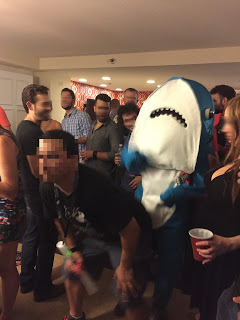 The DC303 party jumped the shark!
The DC303 party jumped the shark!(And the shark twerked back.)And a shout out to barcon, the con that moves to casino bars after all the parties have died a drunken death.
And to the DC949 guys, who, in a stroke of brilliance, decided that rather than throw a party, they should just take the party with them onto the con floor! They're the ones with the brightly-colored LED biohazard backpacks plus magic music-making speaker things. At some point late Friday night, long after the parties, when barcon had begun to grow stale, I found myself dancing behind them, through the streets of Paris, as they led con-goers with their spell, like rats or children following the Pied Piper through Hamelin.
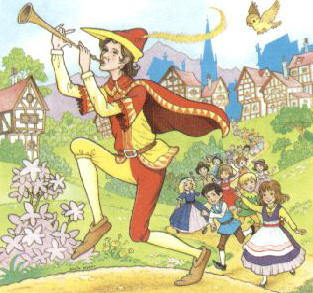 Artist's depiction of the DC949 "party"We ended up in some room, after which, I believe someone stole and returned an electric scooter, the sun came up, and incidents occurred. Not necessarily in that order.
Artist's depiction of the DC949 "party"We ended up in some room, after which, I believe someone stole and returned an electric scooter, the sun came up, and incidents occurred. Not necessarily in that order. Abandoned barcon area over at the Rio. Ah, memories.
Abandoned barcon area over at the Rio. Ah, memories.Uh, I don't remember how I got to the Rio,
but this pic is on my phone, so.Speaking of music, the DEFCON 23 Soundtrack is as cool as ever, but this year even more cool than ever because it is conveniently on Spotify! No more will you have to place the round plastic disk (no, not a record silly; a "CD") into a "player" you no longer own! Now, through the magic of streaming, you can listen to DEFCON wherever and whenever you please. This is an activity I am presently doing, while simultaneously writing this post. It's a DEFCON miracle. (Nevertheless, please donate to the EFF – they are keeping your hacker ass free! FREEDOM!)
If you prefer Pandora, you are flat out of luck, because, what are you still doing on Pandora, grampa??
The End is the Beginning is the End
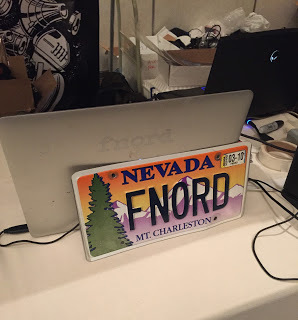
The true hacker spirit is DIY geekery. To harp on the theme of my previous DEFCON write-ups, get involved! Do stuff! L33tness isn't granted only on the ordained by the Gods of Über, and it isn't even a state of mind. It's a gumption to go out there and do something. This attitude merely requires a little bit of confidence and a dash of bravery. It does not require mythical mad skills that only "other" people have. You can acquire the mad skills, or *surprise!* you may already have the certain mad skills that you are currently undervaluing because those things seem so easy to you.
That's my new insight this year: I thought I wasn't involved in DEFCON. But I was! All these years, I've been doing the thing that comes naturally – doing the easy thing that's fun for me to do, so I discounted my own contributions.
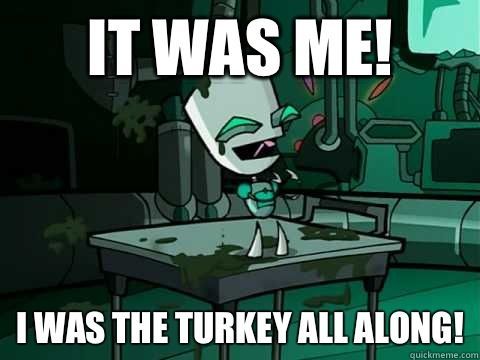 The spirit of turkey is within us all.Other people apparently have found my DEFCON write-ups useful. Writing isn't hacking. Not by any stretch of the imagination. But it's something I'm good at. I let my enthusiasm shine through a comfortable medium.
The spirit of turkey is within us all.Other people apparently have found my DEFCON write-ups useful. Writing isn't hacking. Not by any stretch of the imagination. But it's something I'm good at. I let my enthusiasm shine through a comfortable medium. After doing write-ups each year, more and more people noticed, which opened doors to new opportunities, which enabled me to learn new skills and participate in other ways.
So here's my advice this time around:
Do what comes easy, what you love, keep doing it even if it might not seem cool or seem like it matters. If it's easy for you, it may be tempting to think it's easy for others, and therefore not valuable.
But that's bullcrud! If it's easy for you, that means it's probably fun, and it means you're talented and skilled at it. The thing you're good at might actually be really difficult for others, or you might do it in a way no one's ever thought of doing it before. In a DIY culture, that contribution will probably be worth something to someone eventually. Solder and coding are all the rage right now, but there's a place at DEFCON for all types. Lockpicking wasn't always a thing. Hardware hacking wasn't always a thing. There wasn't always a place for artists. So what's your thing? Can you tie it in to hacking and make it a thing?
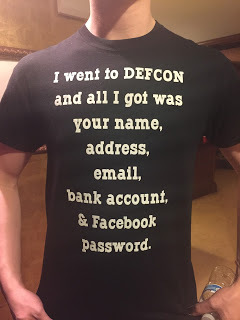 So long, and thanks for all these t-shirts.That is the key advantage of hacker culture. The outside world sees little value in your efforts and weird hobbies. But at DEFCON, we're all huge nerds with obsessions for activities that mainstreamers see as meaningless. There's a good chance that someone will appreciate your passion for what it is.
So long, and thanks for all these t-shirts.That is the key advantage of hacker culture. The outside world sees little value in your efforts and weird hobbies. But at DEFCON, we're all huge nerds with obsessions for activities that mainstreamers see as meaningless. There's a good chance that someone will appreciate your passion for what it is.And you will eventually (not right away) be noticed and appreciated. It will unlock doors into friendships and new connections, more opportunities, more chances for conversations and fun, and exposure to learning new things.
This advice applies not just at DEFCON, but to other communities, too. Over time, as you experience more positive feedback for what you've done, it can, eventually, build your confidence and defeat your Impostor Syndrome.
So start out with the easy stuff. Follow your passion and your curiosity. Experiment, don't be afraid to fail, and by blundering around, you will find your niche.
And most of all, realize that you, too, have something to give. Let's see what you've got.
Published on August 18, 2015 18:41
March 21, 2015
Individualism™
U.S. Individualism:
"Oh, look at this person! What an Individual! They made history! Amazing! Individualism is great!"
"(But they died an unknown penniless pauper...)"
"Oh, how sad! We will strive better to understand the power of Invividuals in the future! Oh! Look at that other great Innovator! He's an individual! Amazing! The system works!"
"(But... He was a big jerk who stole uncredited and uncompensated ideas from others and repressed people to gain wealth and glory.)"
"Never mind! He was a genius! An Individual! Go Individualism!"
"Ok, but the homeless black woman you met on the street today. She was an individual once, who tried to succeed, but every time, from childhood, she was beaten down, even by her own parents, her teachers, all employers who would take her. Like any human would under the circumstances, she broke when she saw how rigged the collective game was. She used her individualism to chose to give up and live on the street rather than face the heartbreak of one more unjust setback."
"Oh. Well, she's a mooch. A leech on a society of Individuals™ like me (not a collective AT ALL!) She should have tried harder! Individualism only applies to those who do what we dictate: Work hard. Be male. Be white. Be educated. Be abled. Above all, BE NORMAL. Play by the collective rules set by collective Individuals who have succeeded before. If you cannot do this, you have not earned the right to be an individual. You have not earned the right to be human."
"Oh, look at this person! What an Individual! They made history! Amazing! Individualism is great!"
"(But they died an unknown penniless pauper...)"
"Oh, how sad! We will strive better to understand the power of Invividuals in the future! Oh! Look at that other great Innovator! He's an individual! Amazing! The system works!"
"(But... He was a big jerk who stole uncredited and uncompensated ideas from others and repressed people to gain wealth and glory.)"
"Never mind! He was a genius! An Individual! Go Individualism!"
"Ok, but the homeless black woman you met on the street today. She was an individual once, who tried to succeed, but every time, from childhood, she was beaten down, even by her own parents, her teachers, all employers who would take her. Like any human would under the circumstances, she broke when she saw how rigged the collective game was. She used her individualism to chose to give up and live on the street rather than face the heartbreak of one more unjust setback."
"Oh. Well, she's a mooch. A leech on a society of Individuals™ like me (not a collective AT ALL!) She should have tried harder! Individualism only applies to those who do what we dictate: Work hard. Be male. Be white. Be educated. Be abled. Above all, BE NORMAL. Play by the collective rules set by collective Individuals who have succeeded before. If you cannot do this, you have not earned the right to be an individual. You have not earned the right to be human."
Published on March 21, 2015 02:14
March 15, 2015
Norwescon 38 Schedule
I'm so excited to be on panels at Norwescon for the first time this year. This is something I've dreamed of since attending Norwescon in the 90s – being an author and sitting on panels talking about smart things. And what a great year to start, with George R.R. Martin as the guest of honor!
Here's my schedule of the smart things I'm going to talk about, along with my reading.
If you're at the con Thursday night, there's actually not much going on, so please come see me read! I need two people in the audience, and one of those people could be you! I will most likely read Touch of Tides, hard science fiction about a woman who uses her synesthesia to make an exciting discovery about life under the ice on Europa. This story is particularly themed towards many of the panels I'll be speaking on. It's a good example of alien communication, women in SF, expanding the sciences in SF, writing about lifeforms outside of our experience, and even, yes, even invisible disabilities to some extent.
Official schedule, April 2-5, 2015:
Writing the Other
Getting into the heart and head of someone or something you’re not, and how to do so with authority.
Thu 4:00pm-5:00pm - Cascade 10
Reading: Luna Lindsey
Probably: Touch of Tides
Thu 9:30pm-10:00pm - Cascade 1
Invisible Disabilities
Not every disability is apparent at a glance, nor is anyone’s personal health anyone else’s business. From mental illness to chronic disease to a variety of syndromes and impairments too lengthy to list, we’ll discuss the difficulties of living with chronic health conditions, the stigmas associated, what progress has (or hasn’t) been made in reforming public perception, and strategies on getting other people to mind their own blasted business.
Fri 11:00am-12:00pm - Cascade 10
Giving Good Alien
It’s pretty darn hard to write about a life form completely outside of our experience. No matter how good an SF story is, if you come across an alien that’s either “just a guy in a suit” or too far from out current understanding of physics, it can throw you out of the story. So what does it take to create a believable alien?
Fri 1:00pm-2:00pm - Evergreen 1&2
Diversity in Spec Fic Publishing
Whitewashed covers, hyper-sexualized female characters, and the all-straight-cis-white-able-bodied cast… how can we make our genre genuinely inclusive, both as members of “otherized†groups or as allies?
Fri 2:00pm-3:00pm - Cascade 3&4
Women In Science Fiction
It’s 2015 and most films (and many books) still fail the Bechdel test. Are there any good female role models in science fiction? Or are they still relegated to being damsels in distress? A discussion of both weak and strong female science fiction characters in modern SF and how authors can (and do) give them life and agency of their own.
Fri 7:00pm-8:00pm - Cascade 7&8
Level Up Your Indie Skillset
How can you tell if your cover design’s a winner? What’s your pricing strategy? Do you format, or pay a service? Self-publishing requires that you pick up secondary skills beyond writing books and Tweeting — we’ll tell you how.
Sat 6:00pm-7:00pm - Cascade 9
Expanding the Sciences in Hard SF
What scientific fields deserve more attention in fiction besides quantum mechanics, biology, genetic engineering? Kim Stanley Robinson has done a wonderful job using geology and climatology, for example. We’ll discuss the best exceptions to the rule, and talk about cutting edge science that has yet to be explored in fiction.
Sat 7:00pm-8:00pm - Cascade 5
Geek Policing: Don't Do It
Geek Policing happens when someone evinces interest in something of the nerdy persuasion, and someone else starts quizzing them on it like nerddom is the Ivy League. It’s not okay. And we, all of us, nerds of all genders, need to stop it. Period.
Sun 12:00pm-1:00pm - Cascade 6
Alien Communication
Humans cannot engage in meaningful conversation with other Earth life, despite centuries of trying. What makes us think that communicating with aliens will be so easy?
Sun 3:00pm-4:00pm - Cascade 3&4
The full Norwescon schedule can be found here: http://www.norwescon.org/con/schedule-of-events/
Here's my schedule of the smart things I'm going to talk about, along with my reading.
If you're at the con Thursday night, there's actually not much going on, so please come see me read! I need two people in the audience, and one of those people could be you! I will most likely read Touch of Tides, hard science fiction about a woman who uses her synesthesia to make an exciting discovery about life under the ice on Europa. This story is particularly themed towards many of the panels I'll be speaking on. It's a good example of alien communication, women in SF, expanding the sciences in SF, writing about lifeforms outside of our experience, and even, yes, even invisible disabilities to some extent.
Official schedule, April 2-5, 2015:
Writing the Other
Getting into the heart and head of someone or something you’re not, and how to do so with authority.
Thu 4:00pm-5:00pm - Cascade 10
Reading: Luna Lindsey
Probably: Touch of Tides
Thu 9:30pm-10:00pm - Cascade 1
Invisible Disabilities
Not every disability is apparent at a glance, nor is anyone’s personal health anyone else’s business. From mental illness to chronic disease to a variety of syndromes and impairments too lengthy to list, we’ll discuss the difficulties of living with chronic health conditions, the stigmas associated, what progress has (or hasn’t) been made in reforming public perception, and strategies on getting other people to mind their own blasted business.
Fri 11:00am-12:00pm - Cascade 10
Giving Good Alien
It’s pretty darn hard to write about a life form completely outside of our experience. No matter how good an SF story is, if you come across an alien that’s either “just a guy in a suit” or too far from out current understanding of physics, it can throw you out of the story. So what does it take to create a believable alien?
Fri 1:00pm-2:00pm - Evergreen 1&2
Diversity in Spec Fic Publishing
Whitewashed covers, hyper-sexualized female characters, and the all-straight-cis-white-able-bodied cast… how can we make our genre genuinely inclusive, both as members of “otherized†groups or as allies?
Fri 2:00pm-3:00pm - Cascade 3&4
Women In Science Fiction
It’s 2015 and most films (and many books) still fail the Bechdel test. Are there any good female role models in science fiction? Or are they still relegated to being damsels in distress? A discussion of both weak and strong female science fiction characters in modern SF and how authors can (and do) give them life and agency of their own.
Fri 7:00pm-8:00pm - Cascade 7&8
Level Up Your Indie Skillset
How can you tell if your cover design’s a winner? What’s your pricing strategy? Do you format, or pay a service? Self-publishing requires that you pick up secondary skills beyond writing books and Tweeting — we’ll tell you how.
Sat 6:00pm-7:00pm - Cascade 9
Expanding the Sciences in Hard SF
What scientific fields deserve more attention in fiction besides quantum mechanics, biology, genetic engineering? Kim Stanley Robinson has done a wonderful job using geology and climatology, for example. We’ll discuss the best exceptions to the rule, and talk about cutting edge science that has yet to be explored in fiction.
Sat 7:00pm-8:00pm - Cascade 5
Geek Policing: Don't Do It
Geek Policing happens when someone evinces interest in something of the nerdy persuasion, and someone else starts quizzing them on it like nerddom is the Ivy League. It’s not okay. And we, all of us, nerds of all genders, need to stop it. Period.
Sun 12:00pm-1:00pm - Cascade 6
Alien Communication
Humans cannot engage in meaningful conversation with other Earth life, despite centuries of trying. What makes us think that communicating with aliens will be so easy?
Sun 3:00pm-4:00pm - Cascade 3&4
The full Norwescon schedule can be found here: http://www.norwescon.org/con/schedule-of-events/
Published on March 15, 2015 11:33
February 25, 2015
Benny, Joon, & Me: An Autism Movie Takes On Ableism & Soundly Defeats It
In 1993, my 19 year old brain latched on to a movie character and wouldn't let go. Now in 2015, I rewatched to find out why.
In 1993 autism was considered a rare condition that was little understood. Few English-speaking mental health professionals had even heard of its higher-functioning form, Asperger Syndrome, because it wouldn't be in the DSM (Diagnostic and Statistics Manual) for another year.
Nevertheless, writers and actors excel at capturing the human spirit. That year, a movie came out that accurately depicted high-functioning autism and directly combated ableism (harmful beliefs about disabled people) in unambiguous terms.
Benny & Joon is unique. How often are two disabled people allowed to fall in love with each other on the big screen? This may be the only autistic romance movie in existence.
If you are autistic, Benny & Joon offers validation, empowerment, and positive self-image. If you know an autistic adult or child, this movie should add depth to your understanding of them. And if you never expect to meet an autist, well, statistics are against you, but at least watch it to have your heart warmed and your awareness expanded.
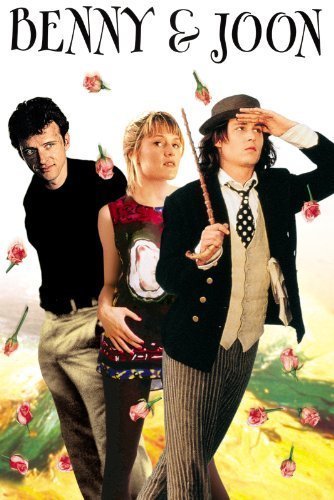
It saddens me, however, that certain critics somehow found Benny & Joon problematic. Throughout this post, I will directly answer the points made by one of these reviews.
I identified with her odd little mannerisms, and knew that, deep down, I wanted to hold the same flat affect on my face and make those jerky, birdlike motions. Her descriptions of the world mirrored my own strange ways of thinking. Her outbursts and unusual speech patterns reflected an inner persona I was holding at bay, like I had this little bit of crazy locked up inside that escaped sometimes when no one was looking. Shortly after seeing the movie the first time, I had a dream. It was of a blond girl, dressed in gray, running nimbly along the top of a castle wall. When she reached the peak, she jumped.
And I awoke.
I knew instantly that she was inspired by Joon. There was this deep sense that the girl was incredibly smart and talented, and yet she was also mentally immature, restricted, and damaged in some way.
It inspired a novella I wrote about a princess kidnapped into slavery, and her will is beaten out of her. She is rescued in adulthood, but never lost her stunted naiveté juxtaposed against a keen mental acuity.
When I finished writing, I realized it was an autobiography: a metaphorical account of my own abuse by teachers and peers, an allegory of the way the world misunderstood me and of all the messages from a world that told me I was crazy and broken.
 I even borrowed a few decorating tips from Joon.
I even borrowed a few decorating tips from Joon.
Colored bottles, knickknacks, brightly colored wispy fabrics.
This is basically my room.Looking back, I can see just how validating this movie was, and how beneficial it was to my own development.
Movies like these give millions of undiagnosed autists something to connect to and a way to feel valued when the rest of the world is marginalizing us for being different.
Evidence of AutismThe movie refers to Joon simply as "mentally ill", and doesn't comment at all on Sam's condition. In 1993, "mentally ill" might have been the only diagnosis available for a high-functioning autist. So we're left to speculate.
The most common armchair diagnosis I've seen online (aside from autism) is that Joon is schizophrenic, and that Sam is "quirky". Perhaps this is because autists are often not thought to be capable of creativity, and since Joon is a painter, she must be schizophrenic?

 So much creationizing!
So much creationizing!
And paintifying! Look at all that paintifying!Misconceptions like this pervade both society and the medical community, which is one reason it took me so long to look into Aspergers for myself. Like Joon, I was merely "quirky" with a tendency towards "mental illness" that I kept under wraps.
So let's clear up the misconceptions.
Autism traits tend to vary widely from person to person, some even manifesting in opposite ways. Many traits haven't been studied and are not part of official diagnostic manuals. When you read about autism long enough and learn about some of the root causes (like sensory processing issues), you start to notice patterns.
Let's consider Sam first. Here are his autistic traits that jumped out quite starkly:Special interest in movies, particularly old movies, particular the silent-film comedian, Buster Keaton.Twenty-six years old, with no job, living with relatives, and not functionally literate."Spends all day polishing forks," according to his cousin.Struggles with his literacy issues when applying for a job.An unorthodox thinker in nearly every regard.Joon's list is longer; she's on screen more.Sudden outbursts, bad enough to chase away housekeepers (aka caregivers).Needs things to be just right or she has an "episode".Picky about housekeepers. Joon rejects them for a long list of imperfections. One committed sins of metaphor, and another, "her hair smelled". These indicate sensory processing issues and a need for certainty and literalism.Seems comforted when she's painting. Particular about food.Wears a helmet when riding in the car.Shows deep creativity and intelligence but no one takes her seriously.Fascinated with fire (for similar reasons why some autists are fascinated by water – watching the flow and movement).Doesn't get along with peers (according to her doctor)."Her stress level is always a factor in her display of symptoms," according to her doctor.Gets hung up on moral details which results in outbursts of anger (moral rigidity)."Her routine is everything to her," Benny describes to Sam.Notable stimming (self-stimulation, like rocking or shaking a leg) when she's nervous.Talks to herself. At some point Benny says that she hears voices, but as it's depicted on screen, it could easily be echolalia, or repetitive vocal stimming.Nearly has a meltdown when Sam plays loud rock music (sensory processing). She takes away his radio. Later, she has trouble articulating the experience, particularly what she was seeing and hearing, which indicates that her verbal skills are conditional.Kicks Sam out for "cleaning the house." Probably because her things got moved — highly anxiety-producing for many autists.She has other traits which are more difficult to describe. For instance, she may have a form of synesthesia, which is common in autists, as evidenced by a scene in which she describes how the raisins in her pudding must feel emotionally. Many autists sense that objects have personalities, either to a mild or extreme degree.
There are only two times when she breaks with autistic behavior.
 STOP: Not typical autistic behavior.At one point, she stands in the middle of the street and "directs traffic" with a ping pong paddle, and acts totally detached from reality. To be very clear, this is not something a typical autist would do, but might be more in line with schizophrenia or bipolar in a hyper-manic phase.
STOP: Not typical autistic behavior.At one point, she stands in the middle of the street and "directs traffic" with a ping pong paddle, and acts totally detached from reality. To be very clear, this is not something a typical autist would do, but might be more in line with schizophrenia or bipolar in a hyper-manic phase.
In another scene, she melts down on a bus in a high-stress situation. Initially, her behavior is in line with an autistic meltdown (including rocking and hand flapping). But as the tension heightens, she becomes paranoid. Such behavior could stem from an extreme meltdown, but not typically.
These exceptions can be explained either by comorbidities (other conditions that occur alongside autism), or as necessary additions to drive the plot.
A Positive Portrayal Autistic people are capable of love, happiness, creativity, and agency.Overall, the film portrays autism in a positive and realistic light, neither overly glorifying it, nor bemoaning our miserable fate. It grapples with real issues that autists and our caregivers or family must face, and manages to frame it in a light-hearted comedy. The theme comes across strongly and can be summarized in this sentence:
Autistic people are capable of love, happiness, creativity, and agency.Overall, the film portrays autism in a positive and realistic light, neither overly glorifying it, nor bemoaning our miserable fate. It grapples with real issues that autists and our caregivers or family must face, and manages to frame it in a light-hearted comedy. The theme comes across strongly and can be summarized in this sentence:
"Disabled people have the right to make their own choices."
The movie represents autists as human and promotes neurodiversity, highlighting the value we can provide to ourselves and those around us, even to those might otherwise see us as useless burdens.
Moreover, Benny & Joon: depicts autists as capable of love and deserving of a love life; depicts autists as capable of happiness, even when we're not "productive" by societal standards; portrays a loving sibling relationship with an autist, where her brother is (for the most part) good to her. (Contrast this to the sibling relationship in Rain Man .)RomanceThe romantic arc truly sets this film apart. It doesn't merely depict a successful autistic love relationship; it goes further, contrasting it to Benny's neurotypical romance with Ruthie.
 Chemistry so powerful you can reach out and touch it.Sam and Joon's chemistry is palpable — innocent and enchanting. They seem to communicate without words. Each seems to have finally found a kindred soul, and, though neither has any experience with love, they take their first steps with grace, with no hint of shame or self-consciousness.
Chemistry so powerful you can reach out and touch it.Sam and Joon's chemistry is palpable — innocent and enchanting. They seem to communicate without words. Each seems to have finally found a kindred soul, and, though neither has any experience with love, they take their first steps with grace, with no hint of shame or self-consciousness.
In contrast, Benny and Ruthie's chemistry is awkward. Joon and Sam are far more socially capable (with each other) than the allistic (non-autistic) leads, who are constantly fumbling. Their barriers to love center around miscommunication and a lack of self-awareness.
 Things are just not coming together for these two.
Things are just not coming together for these two.
These scenes are literally back to back.This is a reversal of the standard expectations and it filled me with glee. It reminds viewers that allists can also be poor at social interactions and empathy, even with each other.
I often say that autism is characterized by extreme mental strengths and specializations juxtaposed against extreme mental deficits. Particularly sweet is how Joon and Sam's autistic extremes compliment one another, each filling in the void left by the other's weaknesses.
In one scene, barely-literate Sam tries to write to his mother. Joon rewrites the letter with hyperlexic skill.
 One of the harsh realities of autism depicted here.
One of the harsh realities of autism depicted here.
Writing is difficult for many on the spectrum,
whereas it comes easily to others, like me.She's got problems of her own, though. For instance, she is sloppy and disorganized. He cleans the house with acute, almost obsessive, attention to detail. In spite of her initial distress, she warms to this pretty quickly.
Is Autism A "Disability"? Or A Difference In CulturesThe story argues for what many autists already believe: that most problems associated with autism aren't intrinsically caused by autism itself. They are more often caused by neurotypical expectations that autists are unable to meet, in an environment that is set up exclusively for neurotypical success.
Every conflict Joon or Sam have is with the world, not with themselves or with each other. Individually, Joon is happy; Sam is happy. And they're happy together.
All of their problems are caused by allists: the endless stream of housekeepers who can't get along with Joon, the doctor who wants to send Joon to a group home, and the overprotective brother who won't let her make her own choices. It's a world in which their talents — her art and Sam's performance comedy — aren't appreciated — at least not enough that anyone will give them a living wage.
While Benny and Ruthie struggle to hook up, Joon and Sam progress blissfully and problem-free. No significant misunderstandings, no hidden defensiveness. You get the sense that if they could live on their own little planet, they'd be perfectly functional.
This is a sentiment expressed by many autists. We feel like we were born on the WrongPlanet. Our most distressing symptoms come from living in an allistic world trying to conform to a neurotypical culture.
 The application process almost proves to be an unbeatable obstacle,
The application process almost proves to be an unbeatable obstacle,
as it is for many on the spectrum. Sam eventually uses his expertise and passion for movies to get a job in a video store. Many autists struggle to feel like their idiosyncratic special interests are useful, but he figures out how to make a living at it. This isn't possible for all autists, but it's at least one role model in a world with none.
It sends a message to society: Don't underestimate us. We have skills. Maybe not the exact skills you want us to have, or we might be rough around the edges, but widen your view and you might be surprised.
"Patronizingly Adorable" or Patronizingly Keeping Us In Our Place?Not all reviewers agree with me. Carleen Tibbetts titled her feminist btchflcks.com review, "The Patronizingly 'Adorable' Side of Schizophrenia." As an autistic woman, I found her review patronizingly dismissive, condescending, and ignorant.
The author of the piece is bipolar, which makes her an authority on invisible disabilities in general, but it does not make her an authority on autism. Just to make it clear: being one neurotype does not make you an expert on other neurotypes. I live with a bipolar woman, a couple of OCDs, and another aspie. I'm careful to never assume their experience.
Even though she concludes that Joon is autistic, Tibbetts insists on using the word "schizophrenic," as if the two neurotypes are interchangeable. It's frankly offensive… probably to schizophrenics, too.
Her lack of knowledge is revealed in a number of places. Most egregious is when she calls Joon's outbursts "tantrums", when she indicates that better meds might help with this and her "erratic behavior". Anyone familiar with ASD would call them "meltdowns," or at the very least, would use non-derogatory terms. They would also understand that, while some meds can help reduce anxiety and lower risk and severity of meltdowns, there is no medication currently that can treat the erratic behavior of autism. Many autists would resist taking such a med out of fear that it would change the very nature of who we are.
 This? Is not a "tantrum.""Tantrum" implies a childish, manipulative call for attention. In reality, a meltdown is a sensory overload that floods our brains with panic or emotional overwhelm, leaving us with little control over our bodies or speech. I tell people a meltdown is like an emotional seizure, and they should treat it like a medical problem. It's poor allyship to perpetuate this marginalizing stereotype.
This? Is not a "tantrum.""Tantrum" implies a childish, manipulative call for attention. In reality, a meltdown is a sensory overload that floods our brains with panic or emotional overwhelm, leaving us with little control over our bodies or speech. I tell people a meltdown is like an emotional seizure, and they should treat it like a medical problem. It's poor allyship to perpetuate this marginalizing stereotype.
Her review flies under the flag of false advocacy. Her outrage at Benny & Joon reminds me of the Derpy Hooves controversy, where parents of developmentally challenged children found the My Little Pony character offensive, and protested to get her edited out of the show. In contrast, the majority of actual autists felt personally attacked. A character we related to was made invisible by our supposed allies. By deleting Derpy, they deleted us.

Save DerpyI dare you not to cry.
The organization Autism Speaks does the same thing in the name of autism advocacy. As does Ms. Tibbetts in this review.
These patronizing, chivalrous, well-meaning allies are Disability Ventriloquists, because they think we're dummies and they try to speak for us. We remain dehumanized, pawns without agency, moved around on the chessboard by whoever speaks for us the loudest.
 I am not your dummy.
I am not your dummy.
#ActuallyAutisticBut I'd like to thank Ms. Tibbetts for being wrong, because she provides a good counterpoint for a detailed look at what this movie does right.
Too Adorkable? Oh noes!The Bitch Flicks review takes greatest issue with how Benny & Joon presents autism:
"There is NOTHING 'adorable' about mental illness… [This movie] trivializes and downplays a serious, crippling disorder."
Ahem.
First, autism is not a "crippling disorder," which is a point made within the film itself when Benny repeatedly underestimates Joon's and Sam's capabilities. For Bitch Flicks to perpetuate this stereotype in the face of a film that attempts to dismantle it is the pinnacle of ablism.
Secondly, Benny & Joon is a comedy. Its job is making us laugh.
Nevertheless, the darker aspects of autism are explicitly portrayed. Benny's life is severely impacted by having to take care of his sister. Sam is grateful to sleep on Benny's couch because his cousin had him sleeping under the sink. Joon nearly burns the house down a couple of times. One of her meltdowns is so uncomfortably and realistically depicted on screen that tears came to my eyes.
 This living situation is an improvement over
This living situation is an improvement over
sleeping under the sink.Autistic life sucks, and this movie gives us glimpses of these harsh realities lurking there beneath the surface.
But life as an autist is awesome, too. We are quirky, fun-loving, talented. Yes, we can giggle and paint and be silly. When we're given full freedom to express ourselves, life is an absolute joy to live, both for us, and for our loved ones.
Should we be condemned to misery, even in fiction, because disabilities are Serious Business? Are we to only have depressing horror films made about us? Is neurotypical society only allowed to see what a burden we are, and how unredeemable and useless we are? Are we supposed to have every light-hearted happy-ending stricken from our collective consciousness?
If I need to see the untarnished details of the most horrific aspects of being "abnormal", I'll watch Melancholia, Girl Interrupted , Heavenly Creatures , or Silence of the Lambs . Or I'll just read my twitter feed for about 15 minutes. Or visit some of my own worst memories.
Problematic? You Don't Get How Stories WorkSome social justice media critics think that if any character acts badly, the whole story is problematic.
I want to destroy that idea right now.
 Ka-boom.Problematic behavior exists in real life, and it therefore should be depicted in fiction.
Ka-boom.Problematic behavior exists in real life, and it therefore should be depicted in fiction.
Why? Because those who experience these situations in real life need something relate to. And those who commit harmful behaviors need to see the harm they cause.
I wish more social justice champions understood how how plot and theme work. Here's a quick rundown:
As Robert McKee points out in Story (a how-to book for screenwriters and novelists) a theme is an argument between two opposing values, which builds, until it reaches a final conclusion.
It's a debate: a fictional argument. You have to show characters acting in opposition. Who will turn out to be right? The story must depict the tragic results of acting on the opposing value. If no character behaves badly, the conclusion will ring hollow.
If you make a movie to combat ablism, you must depict ablism. To make a movie combatting sexism, you must portray sexism. To make a movie against racism, you've got to show some racists. Otherwise, you have a boring, unconvincing movie where nothing happens. And if we successfully remove these types of problematic content from our fiction, our movement will fizzle out and die.
 Combatting oppresssion
Combatting oppresssion
through the power of creativitySo the real proof of a problematic story is in its ending.
We can tell by the ending that the theme of Benny & Joon is, "Developmentally disabled people are capable of, and have the right, to make their own choices."
The movie refuses to justify Benny's abuse of Joon and Sam. It condemns his behavior and then offers him redemption in a very simple form: Stop treating your sister like a child. Let her grow up and follow her own path.
An ableist movie would have sent a smiling Joon off to live safely ever after in an institution. The theme would concluded: "Disabled people cannot think for themselves, so they should live out of sight lest they offend our sensibilities or hurt someone."
Sadly, it seems that Ms. Tibbetts might have preferred that message.
What Seems Problematic Is Actually Good StorytellingBenny has taken care of his sister since their parents died. He resists putting her in a group home because he thinks she won't be happy there, and he wants her to have some level of independence. This is admirable.
But he isn't perfect. He is patronizing and overprotective. Moreover, he's in the difficult position most caregivers are: It's hard to care for someone with special needs. It sets limitations on his free time, money, social life, and energy. He's under a constant emotional drain.
According to Tibbetts, "Benny & Joon deals far more with Benny’s 'unfortunate' situation of having to care for his sister than it does with Joon herself. Yes, although it does speak to Joon’s creativity, her spirit, etc., it doesn’t address the fact that Benny's kept her infantilized most of her adult life."
Firstly, the stress of caregiving shouldn't be so flippantly dismissed. It's clear in this movie that Benny simultaneously loves his sister, enjoys her company, and is becoming resentful of the distress she causes him. This is a realistic situation, and an understandable reaction. As an autistic mother with autistic children, I know this all too well.
Secondly, the movie does far more than address Benny's well-intentioned but misguided mistreatment of his sister. This is, in fact, the whole point of the movie, as is shown through dialog, over and over again.
For example, Sam has been pursuing a job at the video store, where he hopes to capitalize on his special interest. But Benny thinks Sam should make a living as a performer. Sam resists this idea, and in the confrontation, Benny and Joon discuss Sam like he isn't there:
 This is what addressing ableism looks like.
This is what addressing ableism looks like.
Benny comes off looking like a big huge jerk in this scene."What is your problem?" Benny asks Joon. "This is his chance to do something, be somebody."
"He is somebody," Joon replies.
"Yeah, I know, but he wants to be more."
"You don't know what he wants."
The argument for autistic agency couldn't be any more clear. Joon is addressing Benny's tendency to infantilize Sam, and by extension, her. And since she's a strong female protagonist, she stands her ground against the onslaught.
Then Joon turns and invites Sam into the conversation, and the couple tells Benny, in not so many words, that they're "together".
Right on cue, Benny blatantly denies Joon the agency to choose who she loves. He violently kicks Sam out of the house. When she defends her rights, he becomes physically violent with her and decides he's going to send her to the group home, because she can't make good decisions.
Here she is robbed of agency in a very literal way: In the home, she will have no freedom or independence whatsoever.
 Benny, after their fight: "Can I get you anything?"
Benny, after their fight: "Can I get you anything?"
In my head canon, Joon replies, "Yes. A new brother!"Benny's attitude is ableist and misogynist. It's the well-meaning paternalism that mentally and physically disabled people have come to expect from real people everywhere.
Ms. Tibbetts can't seem to see how she, too, reflects this attitude in her review, or how it denies us freedom, agency, love, and the ability to be represented with these qualities. She tries to speak for us in the same way Benny speaks for Sam and Joon, an allist who assumes she knows what we want, what media we should or shouldn't relate to or find meaning in, because she knows what's best for us.
And that makes her a Disability Ventriloquist.
This scene further drives home the point that our greatest problems come from allists who continually try to force us into unnatural and unfulfilling ways of being: whether it's in career direction, institutions, rigid social expectations, abusive teaching techniques, or through certain abusive therapies.
In a later confrontation with Sam, Benny becomes even more abusive. His behavior crosses the line into bullying territory as he is both violent and verbally cruel to Sam:
"You wanna know why everyone laughs at you, Sam? Because you're an idiot."
The comment stings in this context, and the word carries with it the harsh power it once had before it started being so casually tossed around. The same hurtful power the "R" word still carries.
Just to be sure he's clear, Benny puts all the venom he possibly can into his voice and follows up with, "You're a first class moron."
 Oh no. You did NOT just say that.In response, Sam displays that uncanny human insight that we autists are often capable of. He looks past Benny's aggressive outward behavior and pinpoints Benny's deeper issue: "You're scared," he says. Then he asserts his agency and condemns Benny: "I used to look up to you. Now I can't look at you at all."
Oh no. You did NOT just say that.In response, Sam displays that uncanny human insight that we autists are often capable of. He looks past Benny's aggressive outward behavior and pinpoints Benny's deeper issue: "You're scared," he says. Then he asserts his agency and condemns Benny: "I used to look up to you. Now I can't look at you at all."
Sam's simple statement stops Benny. In that magical Hollywood moment, Benny realizes how he's mistreated Joon.
As soon as he sees her, he lets go of her, offering her autonomy, a chance to live on her own and to choose her own relationships.
"I'm through making decisions for you," he says, driving the theme home.
She rightly doesn't trust this change of heart, and during the ensuing argument, she displays the same uncanny autistic insight skill as Sam: "You need me to be sick," she accuses.
Of course this has been true in the past. But Benny has changed. When the doctor pressures Benny to put Joon in a group home ("Joon, we want what's best for you"), he gets his chance to prove his new course in the movie's final thematic pivot. He stops the doctor and says, "Why don't we ask Joon what she wants?"
Conclusion: Joon is a human being; stop treating her like a child.
The Feminist AngleThere are few women in this movie. Two men fight over the girl. These are good flaws to point out.
But I'm also of this opinion: No movie can, or should, escape every problematic trope. When you're throwing new ideas at an audience, you've got to stay focused. If you veer too far from what the audience expects, your point gets lost.
Here's a film that tackles the theme of disability in an impressive way. This argument would have been diluted with sisterhood themes, had Benny instead been Bernadette.
Moreover, we got to see a rarely depicted male character: a nurturing and loving brother who sacrifices money, relationships, and free time, to take care of his sister. This important portrayal helps defeat patriarchal macho-male stereotypes.
Or imagine if Sam was instead Samantha. In 1993, no one would have gone to see the movie, and even today, the disability theme would be completely obliterated by a more controversial LGBT theme.
Tibbetts criticizes the film for giving Sam's talents more screen time than Joon's. But we actually spend far more time following Joon. She is the first person we see, and Sam isn't even introduced until 20 minutes in. We already like her, so we don't need to see dwell on her talents. (Plus, it's kind of boring to watch someone paint.)
Sam is the manic pixie dream boy, who exists solely to liberate Joon from her cloistered, sheltered life. We're not rooting for Sam to win Joon; we're rooting for Joon to win Sam. It's a reversal of the boy-meets-girl trope, so we're watching Sam through her gaze; we need to see what she likes about him.
 So manic. So pixie.
So manic. So pixie.
#SwoonAfter all, she is the one doing the choosing. And that portrayal gets two thumbs up from this feminist.
Mental Health Services Are The Answer?Ms. Tibbitts claims the movie doesn't show Joon getting treatment of any kind. I have to wonder if she fell asleep during the scenes with the aforementioned doctor. In one scene, Joon exits a personal session which I assumed was therapy. She is also on medication.
There is no reason to assume this suddenly stops just because Joon moves out. We might also hope they are able to get social services. Those details are the sort of boring minutia reserved for Wikipedia, government websites, and clinic pamphlets. Not for the ending of a movie.
Ms. Tibbitts' attitude seems to imply that getting help is easy and safe. It is not necessarily either. Most disabled people are pressed for money, professional help is expensive, insurance doesn't cover most of our needs, and social services are severely lacking and difficult to navigate, especially for people on the autistic spectrum.
Even when we can find a way to pay for it, and get through the paperwork, mental health services are desperately in shortage, in what USA Today calls a "man-made disaster".
 From:
From:
http://www.afaa-us.org/storage/documents/OAR_NYCA_survey_Current_State_of_Services_for_Adults_with_Autism.pdfWorse, there are many dangerous programs and therapies that cause more harm than good. Controversy surrounds even some commonly accepted practices.
 A news story about abuses at the Judge Rotenberg Center
A news story about abuses at the Judge Rotenberg Center
just last summer. Yes, including electroshock therapy. (Aug 2014)Moving into a group home is not all happiness and daisies. As the doctor in the movie says, "These are very nice places," but they always say that. Institutions are often rife with all manner of abuses, ranging from neglect (and here), to electroshock therapy, to outright beatings and rape. It's nice to think those barbaric practices are a thing of the past, but we can't count on it.
Yes, therapy, meds, treatment are often beneficial. But it's dangerous to pretend these solutions are the answer for every autistic person. It bothers me to no end when allists carelessly toss them out as if it's all solved. It most certainly isn't.
For some autists, love is the only available answer. And many don't even have that.
Strong Disabled Female CharacterMs. Tibbetts' review concludes, "…the underlying message [is] that all Joon really needs is a stable romantic relationship rather than a stable relationship with herself, especially in relation to functioning in the outside world…"
 Thanks for your concern Ms. Feminist Lady, but I like myself fine.
Thanks for your concern Ms. Feminist Lady, but I like myself fine.
Oh, and also?
#SwoonSorry, but Joon likes herself just fine, and neurotypicals be damned. She makes her choices and continues to assert herself against a powerful force that seeks to completely take away her freedom. Through meeting Sam, a fellow autist, she finalizes her already-begun self-actualization. She is liberated.
She isn't cured or changed. Instead, the world changes to allow her to live as she chooses.
This is what the neurodiversity and anti-ableism movement is fighting for. We wish to be accepted without having to force ourselves into the mold society expects of us.
Yet it's by this mold that the reviewer judges Joon. She implies that Joon isn't in a stable relationship with herself unless it's in relation to the neurotypical world. Her relation to herself, only to herself, as a hetro woman in love with another disabled person, letting him provide for her so she can make art, doesn't seem matter.
In the end, Joon and Sam don't let ableist messages control them. And neither will I. I won't let Disability Ventriloquists speak for me. No matter how well-intentioned they are.
In 1993 autism was considered a rare condition that was little understood. Few English-speaking mental health professionals had even heard of its higher-functioning form, Asperger Syndrome, because it wouldn't be in the DSM (Diagnostic and Statistics Manual) for another year.
Nevertheless, writers and actors excel at capturing the human spirit. That year, a movie came out that accurately depicted high-functioning autism and directly combated ableism (harmful beliefs about disabled people) in unambiguous terms.
Benny & Joon is unique. How often are two disabled people allowed to fall in love with each other on the big screen? This may be the only autistic romance movie in existence.
If you are autistic, Benny & Joon offers validation, empowerment, and positive self-image. If you know an autistic adult or child, this movie should add depth to your understanding of them. And if you never expect to meet an autist, well, statistics are against you, but at least watch it to have your heart warmed and your awareness expanded.

It saddens me, however, that certain critics somehow found Benny & Joon problematic. Throughout this post, I will directly answer the points made by one of these reviews.
Spoiler warning: This review reveals plot points and thematic arcs, but don't worry. The formulaic storyline is already somewhat predictable; the joy is in seeing it played out on screen by interesting characters. You might even enjoy it more by having this autistic lens to view it through.Why My Brain Latched On and Wouldn't Let GoWhen I first saw this movie, I didn't know that 18 years later I would be diagnosed with Aspergers. But my subconscious knew that Joon was like me. I loved Joon. I admired her. I related to her.
I identified with her odd little mannerisms, and knew that, deep down, I wanted to hold the same flat affect on my face and make those jerky, birdlike motions. Her descriptions of the world mirrored my own strange ways of thinking. Her outbursts and unusual speech patterns reflected an inner persona I was holding at bay, like I had this little bit of crazy locked up inside that escaped sometimes when no one was looking. Shortly after seeing the movie the first time, I had a dream. It was of a blond girl, dressed in gray, running nimbly along the top of a castle wall. When she reached the peak, she jumped.
And I awoke.
I knew instantly that she was inspired by Joon. There was this deep sense that the girl was incredibly smart and talented, and yet she was also mentally immature, restricted, and damaged in some way.
It inspired a novella I wrote about a princess kidnapped into slavery, and her will is beaten out of her. She is rescued in adulthood, but never lost her stunted naiveté juxtaposed against a keen mental acuity.
When I finished writing, I realized it was an autobiography: a metaphorical account of my own abuse by teachers and peers, an allegory of the way the world misunderstood me and of all the messages from a world that told me I was crazy and broken.
 I even borrowed a few decorating tips from Joon.
I even borrowed a few decorating tips from Joon. Colored bottles, knickknacks, brightly colored wispy fabrics.
This is basically my room.Looking back, I can see just how validating this movie was, and how beneficial it was to my own development.
Movies like these give millions of undiagnosed autists something to connect to and a way to feel valued when the rest of the world is marginalizing us for being different.
Evidence of AutismThe movie refers to Joon simply as "mentally ill", and doesn't comment at all on Sam's condition. In 1993, "mentally ill" might have been the only diagnosis available for a high-functioning autist. So we're left to speculate.
The most common armchair diagnosis I've seen online (aside from autism) is that Joon is schizophrenic, and that Sam is "quirky". Perhaps this is because autists are often not thought to be capable of creativity, and since Joon is a painter, she must be schizophrenic?

 So much creationizing!
So much creationizing!And paintifying! Look at all that paintifying!Misconceptions like this pervade both society and the medical community, which is one reason it took me so long to look into Aspergers for myself. Like Joon, I was merely "quirky" with a tendency towards "mental illness" that I kept under wraps.
So let's clear up the misconceptions.
Autism traits tend to vary widely from person to person, some even manifesting in opposite ways. Many traits haven't been studied and are not part of official diagnostic manuals. When you read about autism long enough and learn about some of the root causes (like sensory processing issues), you start to notice patterns.
Let's consider Sam first. Here are his autistic traits that jumped out quite starkly:Special interest in movies, particularly old movies, particular the silent-film comedian, Buster Keaton.Twenty-six years old, with no job, living with relatives, and not functionally literate."Spends all day polishing forks," according to his cousin.Struggles with his literacy issues when applying for a job.An unorthodox thinker in nearly every regard.Joon's list is longer; she's on screen more.Sudden outbursts, bad enough to chase away housekeepers (aka caregivers).Needs things to be just right or she has an "episode".Picky about housekeepers. Joon rejects them for a long list of imperfections. One committed sins of metaphor, and another, "her hair smelled". These indicate sensory processing issues and a need for certainty and literalism.Seems comforted when she's painting. Particular about food.Wears a helmet when riding in the car.Shows deep creativity and intelligence but no one takes her seriously.Fascinated with fire (for similar reasons why some autists are fascinated by water – watching the flow and movement).Doesn't get along with peers (according to her doctor)."Her stress level is always a factor in her display of symptoms," according to her doctor.Gets hung up on moral details which results in outbursts of anger (moral rigidity)."Her routine is everything to her," Benny describes to Sam.Notable stimming (self-stimulation, like rocking or shaking a leg) when she's nervous.Talks to herself. At some point Benny says that she hears voices, but as it's depicted on screen, it could easily be echolalia, or repetitive vocal stimming.Nearly has a meltdown when Sam plays loud rock music (sensory processing). She takes away his radio. Later, she has trouble articulating the experience, particularly what she was seeing and hearing, which indicates that her verbal skills are conditional.Kicks Sam out for "cleaning the house." Probably because her things got moved — highly anxiety-producing for many autists.She has other traits which are more difficult to describe. For instance, she may have a form of synesthesia, which is common in autists, as evidenced by a scene in which she describes how the raisins in her pudding must feel emotionally. Many autists sense that objects have personalities, either to a mild or extreme degree.
There are only two times when she breaks with autistic behavior.
 STOP: Not typical autistic behavior.At one point, she stands in the middle of the street and "directs traffic" with a ping pong paddle, and acts totally detached from reality. To be very clear, this is not something a typical autist would do, but might be more in line with schizophrenia or bipolar in a hyper-manic phase.
STOP: Not typical autistic behavior.At one point, she stands in the middle of the street and "directs traffic" with a ping pong paddle, and acts totally detached from reality. To be very clear, this is not something a typical autist would do, but might be more in line with schizophrenia or bipolar in a hyper-manic phase. In another scene, she melts down on a bus in a high-stress situation. Initially, her behavior is in line with an autistic meltdown (including rocking and hand flapping). But as the tension heightens, she becomes paranoid. Such behavior could stem from an extreme meltdown, but not typically.
These exceptions can be explained either by comorbidities (other conditions that occur alongside autism), or as necessary additions to drive the plot.
A Positive Portrayal
 Autistic people are capable of love, happiness, creativity, and agency.Overall, the film portrays autism in a positive and realistic light, neither overly glorifying it, nor bemoaning our miserable fate. It grapples with real issues that autists and our caregivers or family must face, and manages to frame it in a light-hearted comedy. The theme comes across strongly and can be summarized in this sentence:
Autistic people are capable of love, happiness, creativity, and agency.Overall, the film portrays autism in a positive and realistic light, neither overly glorifying it, nor bemoaning our miserable fate. It grapples with real issues that autists and our caregivers or family must face, and manages to frame it in a light-hearted comedy. The theme comes across strongly and can be summarized in this sentence: "Disabled people have the right to make their own choices."
The movie represents autists as human and promotes neurodiversity, highlighting the value we can provide to ourselves and those around us, even to those might otherwise see us as useless burdens.
Moreover, Benny & Joon: depicts autists as capable of love and deserving of a love life; depicts autists as capable of happiness, even when we're not "productive" by societal standards; portrays a loving sibling relationship with an autist, where her brother is (for the most part) good to her. (Contrast this to the sibling relationship in Rain Man .)RomanceThe romantic arc truly sets this film apart. It doesn't merely depict a successful autistic love relationship; it goes further, contrasting it to Benny's neurotypical romance with Ruthie.
 Chemistry so powerful you can reach out and touch it.Sam and Joon's chemistry is palpable — innocent and enchanting. They seem to communicate without words. Each seems to have finally found a kindred soul, and, though neither has any experience with love, they take their first steps with grace, with no hint of shame or self-consciousness.
Chemistry so powerful you can reach out and touch it.Sam and Joon's chemistry is palpable — innocent and enchanting. They seem to communicate without words. Each seems to have finally found a kindred soul, and, though neither has any experience with love, they take their first steps with grace, with no hint of shame or self-consciousness.In contrast, Benny and Ruthie's chemistry is awkward. Joon and Sam are far more socially capable (with each other) than the allistic (non-autistic) leads, who are constantly fumbling. Their barriers to love center around miscommunication and a lack of self-awareness.
 Things are just not coming together for these two.
Things are just not coming together for these two.These scenes are literally back to back.This is a reversal of the standard expectations and it filled me with glee. It reminds viewers that allists can also be poor at social interactions and empathy, even with each other.
I often say that autism is characterized by extreme mental strengths and specializations juxtaposed against extreme mental deficits. Particularly sweet is how Joon and Sam's autistic extremes compliment one another, each filling in the void left by the other's weaknesses.
In one scene, barely-literate Sam tries to write to his mother. Joon rewrites the letter with hyperlexic skill.
 One of the harsh realities of autism depicted here.
One of the harsh realities of autism depicted here.Writing is difficult for many on the spectrum,
whereas it comes easily to others, like me.She's got problems of her own, though. For instance, she is sloppy and disorganized. He cleans the house with acute, almost obsessive, attention to detail. In spite of her initial distress, she warms to this pretty quickly.
Is Autism A "Disability"? Or A Difference In CulturesThe story argues for what many autists already believe: that most problems associated with autism aren't intrinsically caused by autism itself. They are more often caused by neurotypical expectations that autists are unable to meet, in an environment that is set up exclusively for neurotypical success.
Every conflict Joon or Sam have is with the world, not with themselves or with each other. Individually, Joon is happy; Sam is happy. And they're happy together.
All of their problems are caused by allists: the endless stream of housekeepers who can't get along with Joon, the doctor who wants to send Joon to a group home, and the overprotective brother who won't let her make her own choices. It's a world in which their talents — her art and Sam's performance comedy — aren't appreciated — at least not enough that anyone will give them a living wage.
While Benny and Ruthie struggle to hook up, Joon and Sam progress blissfully and problem-free. No significant misunderstandings, no hidden defensiveness. You get the sense that if they could live on their own little planet, they'd be perfectly functional.
This is a sentiment expressed by many autists. We feel like we were born on the WrongPlanet. Our most distressing symptoms come from living in an allistic world trying to conform to a neurotypical culture.
 The application process almost proves to be an unbeatable obstacle,
The application process almost proves to be an unbeatable obstacle,as it is for many on the spectrum. Sam eventually uses his expertise and passion for movies to get a job in a video store. Many autists struggle to feel like their idiosyncratic special interests are useful, but he figures out how to make a living at it. This isn't possible for all autists, but it's at least one role model in a world with none.
It sends a message to society: Don't underestimate us. We have skills. Maybe not the exact skills you want us to have, or we might be rough around the edges, but widen your view and you might be surprised.
"Patronizingly Adorable" or Patronizingly Keeping Us In Our Place?Not all reviewers agree with me. Carleen Tibbetts titled her feminist btchflcks.com review, "The Patronizingly 'Adorable' Side of Schizophrenia." As an autistic woman, I found her review patronizingly dismissive, condescending, and ignorant.
The author of the piece is bipolar, which makes her an authority on invisible disabilities in general, but it does not make her an authority on autism. Just to make it clear: being one neurotype does not make you an expert on other neurotypes. I live with a bipolar woman, a couple of OCDs, and another aspie. I'm careful to never assume their experience.
Even though she concludes that Joon is autistic, Tibbetts insists on using the word "schizophrenic," as if the two neurotypes are interchangeable. It's frankly offensive… probably to schizophrenics, too.
Her lack of knowledge is revealed in a number of places. Most egregious is when she calls Joon's outbursts "tantrums", when she indicates that better meds might help with this and her "erratic behavior". Anyone familiar with ASD would call them "meltdowns," or at the very least, would use non-derogatory terms. They would also understand that, while some meds can help reduce anxiety and lower risk and severity of meltdowns, there is no medication currently that can treat the erratic behavior of autism. Many autists would resist taking such a med out of fear that it would change the very nature of who we are.
 This? Is not a "tantrum.""Tantrum" implies a childish, manipulative call for attention. In reality, a meltdown is a sensory overload that floods our brains with panic or emotional overwhelm, leaving us with little control over our bodies or speech. I tell people a meltdown is like an emotional seizure, and they should treat it like a medical problem. It's poor allyship to perpetuate this marginalizing stereotype.
This? Is not a "tantrum.""Tantrum" implies a childish, manipulative call for attention. In reality, a meltdown is a sensory overload that floods our brains with panic or emotional overwhelm, leaving us with little control over our bodies or speech. I tell people a meltdown is like an emotional seizure, and they should treat it like a medical problem. It's poor allyship to perpetuate this marginalizing stereotype.Her review flies under the flag of false advocacy. Her outrage at Benny & Joon reminds me of the Derpy Hooves controversy, where parents of developmentally challenged children found the My Little Pony character offensive, and protested to get her edited out of the show. In contrast, the majority of actual autists felt personally attacked. A character we related to was made invisible by our supposed allies. By deleting Derpy, they deleted us.

Save DerpyI dare you not to cry.
The organization Autism Speaks does the same thing in the name of autism advocacy. As does Ms. Tibbetts in this review.
These patronizing, chivalrous, well-meaning allies are Disability Ventriloquists, because they think we're dummies and they try to speak for us. We remain dehumanized, pawns without agency, moved around on the chessboard by whoever speaks for us the loudest.
 I am not your dummy.
I am not your dummy.#ActuallyAutisticBut I'd like to thank Ms. Tibbetts for being wrong, because she provides a good counterpoint for a detailed look at what this movie does right.
Too Adorkable? Oh noes!The Bitch Flicks review takes greatest issue with how Benny & Joon presents autism:
"There is NOTHING 'adorable' about mental illness… [This movie] trivializes and downplays a serious, crippling disorder."
Ahem.
First, autism is not a "crippling disorder," which is a point made within the film itself when Benny repeatedly underestimates Joon's and Sam's capabilities. For Bitch Flicks to perpetuate this stereotype in the face of a film that attempts to dismantle it is the pinnacle of ablism.
Secondly, Benny & Joon is a comedy. Its job is making us laugh.
Nevertheless, the darker aspects of autism are explicitly portrayed. Benny's life is severely impacted by having to take care of his sister. Sam is grateful to sleep on Benny's couch because his cousin had him sleeping under the sink. Joon nearly burns the house down a couple of times. One of her meltdowns is so uncomfortably and realistically depicted on screen that tears came to my eyes.
 This living situation is an improvement over
This living situation is an improvement oversleeping under the sink.Autistic life sucks, and this movie gives us glimpses of these harsh realities lurking there beneath the surface.
But life as an autist is awesome, too. We are quirky, fun-loving, talented. Yes, we can giggle and paint and be silly. When we're given full freedom to express ourselves, life is an absolute joy to live, both for us, and for our loved ones.
Should we be condemned to misery, even in fiction, because disabilities are Serious Business? Are we to only have depressing horror films made about us? Is neurotypical society only allowed to see what a burden we are, and how unredeemable and useless we are? Are we supposed to have every light-hearted happy-ending stricken from our collective consciousness?
If I need to see the untarnished details of the most horrific aspects of being "abnormal", I'll watch Melancholia, Girl Interrupted , Heavenly Creatures , or Silence of the Lambs . Or I'll just read my twitter feed for about 15 minutes. Or visit some of my own worst memories.
Problematic? You Don't Get How Stories WorkSome social justice media critics think that if any character acts badly, the whole story is problematic.
I want to destroy that idea right now.
 Ka-boom.Problematic behavior exists in real life, and it therefore should be depicted in fiction.
Ka-boom.Problematic behavior exists in real life, and it therefore should be depicted in fiction.Why? Because those who experience these situations in real life need something relate to. And those who commit harmful behaviors need to see the harm they cause.
I wish more social justice champions understood how how plot and theme work. Here's a quick rundown:
As Robert McKee points out in Story (a how-to book for screenwriters and novelists) a theme is an argument between two opposing values, which builds, until it reaches a final conclusion.
It's a debate: a fictional argument. You have to show characters acting in opposition. Who will turn out to be right? The story must depict the tragic results of acting on the opposing value. If no character behaves badly, the conclusion will ring hollow.
If you make a movie to combat ablism, you must depict ablism. To make a movie combatting sexism, you must portray sexism. To make a movie against racism, you've got to show some racists. Otherwise, you have a boring, unconvincing movie where nothing happens. And if we successfully remove these types of problematic content from our fiction, our movement will fizzle out and die.
 Combatting oppresssion
Combatting oppresssionthrough the power of creativitySo the real proof of a problematic story is in its ending.
We can tell by the ending that the theme of Benny & Joon is, "Developmentally disabled people are capable of, and have the right, to make their own choices."
The movie refuses to justify Benny's abuse of Joon and Sam. It condemns his behavior and then offers him redemption in a very simple form: Stop treating your sister like a child. Let her grow up and follow her own path.
An ableist movie would have sent a smiling Joon off to live safely ever after in an institution. The theme would concluded: "Disabled people cannot think for themselves, so they should live out of sight lest they offend our sensibilities or hurt someone."
Sadly, it seems that Ms. Tibbetts might have preferred that message.
What Seems Problematic Is Actually Good StorytellingBenny has taken care of his sister since their parents died. He resists putting her in a group home because he thinks she won't be happy there, and he wants her to have some level of independence. This is admirable.
But he isn't perfect. He is patronizing and overprotective. Moreover, he's in the difficult position most caregivers are: It's hard to care for someone with special needs. It sets limitations on his free time, money, social life, and energy. He's under a constant emotional drain.
According to Tibbetts, "Benny & Joon deals far more with Benny’s 'unfortunate' situation of having to care for his sister than it does with Joon herself. Yes, although it does speak to Joon’s creativity, her spirit, etc., it doesn’t address the fact that Benny's kept her infantilized most of her adult life."
Firstly, the stress of caregiving shouldn't be so flippantly dismissed. It's clear in this movie that Benny simultaneously loves his sister, enjoys her company, and is becoming resentful of the distress she causes him. This is a realistic situation, and an understandable reaction. As an autistic mother with autistic children, I know this all too well.
Secondly, the movie does far more than address Benny's well-intentioned but misguided mistreatment of his sister. This is, in fact, the whole point of the movie, as is shown through dialog, over and over again.
For example, Sam has been pursuing a job at the video store, where he hopes to capitalize on his special interest. But Benny thinks Sam should make a living as a performer. Sam resists this idea, and in the confrontation, Benny and Joon discuss Sam like he isn't there:
 This is what addressing ableism looks like.
This is what addressing ableism looks like.Benny comes off looking like a big huge jerk in this scene."What is your problem?" Benny asks Joon. "This is his chance to do something, be somebody."
"He is somebody," Joon replies.
"Yeah, I know, but he wants to be more."
"You don't know what he wants."
The argument for autistic agency couldn't be any more clear. Joon is addressing Benny's tendency to infantilize Sam, and by extension, her. And since she's a strong female protagonist, she stands her ground against the onslaught.
Then Joon turns and invites Sam into the conversation, and the couple tells Benny, in not so many words, that they're "together".
Right on cue, Benny blatantly denies Joon the agency to choose who she loves. He violently kicks Sam out of the house. When she defends her rights, he becomes physically violent with her and decides he's going to send her to the group home, because she can't make good decisions.
Here she is robbed of agency in a very literal way: In the home, she will have no freedom or independence whatsoever.
 Benny, after their fight: "Can I get you anything?"
Benny, after their fight: "Can I get you anything?" In my head canon, Joon replies, "Yes. A new brother!"Benny's attitude is ableist and misogynist. It's the well-meaning paternalism that mentally and physically disabled people have come to expect from real people everywhere.
Ms. Tibbetts can't seem to see how she, too, reflects this attitude in her review, or how it denies us freedom, agency, love, and the ability to be represented with these qualities. She tries to speak for us in the same way Benny speaks for Sam and Joon, an allist who assumes she knows what we want, what media we should or shouldn't relate to or find meaning in, because she knows what's best for us.
And that makes her a Disability Ventriloquist.
This scene further drives home the point that our greatest problems come from allists who continually try to force us into unnatural and unfulfilling ways of being: whether it's in career direction, institutions, rigid social expectations, abusive teaching techniques, or through certain abusive therapies.
In a later confrontation with Sam, Benny becomes even more abusive. His behavior crosses the line into bullying territory as he is both violent and verbally cruel to Sam:
"You wanna know why everyone laughs at you, Sam? Because you're an idiot."
The comment stings in this context, and the word carries with it the harsh power it once had before it started being so casually tossed around. The same hurtful power the "R" word still carries.
Just to be sure he's clear, Benny puts all the venom he possibly can into his voice and follows up with, "You're a first class moron."
 Oh no. You did NOT just say that.In response, Sam displays that uncanny human insight that we autists are often capable of. He looks past Benny's aggressive outward behavior and pinpoints Benny's deeper issue: "You're scared," he says. Then he asserts his agency and condemns Benny: "I used to look up to you. Now I can't look at you at all."
Oh no. You did NOT just say that.In response, Sam displays that uncanny human insight that we autists are often capable of. He looks past Benny's aggressive outward behavior and pinpoints Benny's deeper issue: "You're scared," he says. Then he asserts his agency and condemns Benny: "I used to look up to you. Now I can't look at you at all."Sam's simple statement stops Benny. In that magical Hollywood moment, Benny realizes how he's mistreated Joon.
As soon as he sees her, he lets go of her, offering her autonomy, a chance to live on her own and to choose her own relationships.
"I'm through making decisions for you," he says, driving the theme home.
She rightly doesn't trust this change of heart, and during the ensuing argument, she displays the same uncanny autistic insight skill as Sam: "You need me to be sick," she accuses.
Of course this has been true in the past. But Benny has changed. When the doctor pressures Benny to put Joon in a group home ("Joon, we want what's best for you"), he gets his chance to prove his new course in the movie's final thematic pivot. He stops the doctor and says, "Why don't we ask Joon what she wants?"
Conclusion: Joon is a human being; stop treating her like a child.
The Feminist AngleThere are few women in this movie. Two men fight over the girl. These are good flaws to point out.
But I'm also of this opinion: No movie can, or should, escape every problematic trope. When you're throwing new ideas at an audience, you've got to stay focused. If you veer too far from what the audience expects, your point gets lost.
Here's a film that tackles the theme of disability in an impressive way. This argument would have been diluted with sisterhood themes, had Benny instead been Bernadette.
Moreover, we got to see a rarely depicted male character: a nurturing and loving brother who sacrifices money, relationships, and free time, to take care of his sister. This important portrayal helps defeat patriarchal macho-male stereotypes.
Or imagine if Sam was instead Samantha. In 1993, no one would have gone to see the movie, and even today, the disability theme would be completely obliterated by a more controversial LGBT theme.
Tibbetts criticizes the film for giving Sam's talents more screen time than Joon's. But we actually spend far more time following Joon. She is the first person we see, and Sam isn't even introduced until 20 minutes in. We already like her, so we don't need to see dwell on her talents. (Plus, it's kind of boring to watch someone paint.)
Sam is the manic pixie dream boy, who exists solely to liberate Joon from her cloistered, sheltered life. We're not rooting for Sam to win Joon; we're rooting for Joon to win Sam. It's a reversal of the boy-meets-girl trope, so we're watching Sam through her gaze; we need to see what she likes about him.
 So manic. So pixie.
So manic. So pixie.#SwoonAfter all, she is the one doing the choosing. And that portrayal gets two thumbs up from this feminist.
Mental Health Services Are The Answer?Ms. Tibbitts claims the movie doesn't show Joon getting treatment of any kind. I have to wonder if she fell asleep during the scenes with the aforementioned doctor. In one scene, Joon exits a personal session which I assumed was therapy. She is also on medication.
There is no reason to assume this suddenly stops just because Joon moves out. We might also hope they are able to get social services. Those details are the sort of boring minutia reserved for Wikipedia, government websites, and clinic pamphlets. Not for the ending of a movie.
Ms. Tibbitts' attitude seems to imply that getting help is easy and safe. It is not necessarily either. Most disabled people are pressed for money, professional help is expensive, insurance doesn't cover most of our needs, and social services are severely lacking and difficult to navigate, especially for people on the autistic spectrum.
Even when we can find a way to pay for it, and get through the paperwork, mental health services are desperately in shortage, in what USA Today calls a "man-made disaster".
 From:
From:http://www.afaa-us.org/storage/documents/OAR_NYCA_survey_Current_State_of_Services_for_Adults_with_Autism.pdfWorse, there are many dangerous programs and therapies that cause more harm than good. Controversy surrounds even some commonly accepted practices.
 A news story about abuses at the Judge Rotenberg Center
A news story about abuses at the Judge Rotenberg Centerjust last summer. Yes, including electroshock therapy. (Aug 2014)Moving into a group home is not all happiness and daisies. As the doctor in the movie says, "These are very nice places," but they always say that. Institutions are often rife with all manner of abuses, ranging from neglect (and here), to electroshock therapy, to outright beatings and rape. It's nice to think those barbaric practices are a thing of the past, but we can't count on it.
Yes, therapy, meds, treatment are often beneficial. But it's dangerous to pretend these solutions are the answer for every autistic person. It bothers me to no end when allists carelessly toss them out as if it's all solved. It most certainly isn't.
For some autists, love is the only available answer. And many don't even have that.
Strong Disabled Female CharacterMs. Tibbetts' review concludes, "…the underlying message [is] that all Joon really needs is a stable romantic relationship rather than a stable relationship with herself, especially in relation to functioning in the outside world…"
 Thanks for your concern Ms. Feminist Lady, but I like myself fine.
Thanks for your concern Ms. Feminist Lady, but I like myself fine.Oh, and also?
#SwoonSorry, but Joon likes herself just fine, and neurotypicals be damned. She makes her choices and continues to assert herself against a powerful force that seeks to completely take away her freedom. Through meeting Sam, a fellow autist, she finalizes her already-begun self-actualization. She is liberated.
She isn't cured or changed. Instead, the world changes to allow her to live as she chooses.
This is what the neurodiversity and anti-ableism movement is fighting for. We wish to be accepted without having to force ourselves into the mold society expects of us.
Yet it's by this mold that the reviewer judges Joon. She implies that Joon isn't in a stable relationship with herself unless it's in relation to the neurotypical world. Her relation to herself, only to herself, as a hetro woman in love with another disabled person, letting him provide for her so she can make art, doesn't seem matter.
In the end, Joon and Sam don't let ableist messages control them. And neither will I. I won't let Disability Ventriloquists speak for me. No matter how well-intentioned they are.
Published on February 25, 2015 21:08
February 20, 2015
The Meaning of Dreams
Stories are metaphors. From the moment they arise from the author's deepest dreams, to the second they enter the reader's mind, a story is a form of telepathic communication that conveys images, ideas, and philosophy in a way that no other medium can.
The message may become garbled. The reader may experience something other than what the author intended. And that's okay. Because the reader can only take in what she is ready to take. She can only comprehend what she is prepared for, and for what every unique moment in her individualized life experience has set her up for. She may feel completely different feelings than I've sent to her, but if she feels something that is personally meaningful to her, then the cycle of communication is complete.
Fantasy, science fiction, and horror, otherwise known as "speculative fiction", is the most ripe for conveying messages on this wavelength of metaphor. Because anything can happen, because fantastic worlds are built with rules that differ from our own, those rules can better represent the wispy, intangible form of language our subconscious minds speak: the language of symbols.

The Legends and Dreams story bundle contains eight such stories. What will pop into your subconscious when you experience a world in which entertainment conveys not only light and sound, but also touch and sensation, as it does in Tonya Macalina's Faces in the Water?
What speaks to you about a human boy capable of turning into an aquatic being of myth, like in Roslyn MacFarland's See No Sea?
What is most intriguing about a society of masked political maneuvering and courtly subterfuge as depicted in E.M. Prazeman's Masks?
Where will your mind take you when you read about a girl born with a spectral limb in Ripley Paton's Ghost Hand?
Or more down to earth, will you connect to Courtney Pierce's protagonist, who hunts for a killer and deals with her mother's death, in Stitches?
Perhaps a tale of traveling to magical realities will speak to your psyche, like Pamela Bainbridge-Cowan's The Butterfly.
If that doesn't call to your inner Jungian archetypes, there's another world you can travel to via the two characters in Crystal Doors: A steampunk world of science and magic by bestsellers Kevin J. Anderson and Rebecca Moesta.

As the author of Emerald City Dreamer, also included in the bundle, I can speak to the metaphors I hoped to convey. But perhaps you will have a different take away. I wanted to show the struggle between reason and hope, between cold logic and creativity. It is dedicated to those of us who have worked corporate day jobs, but wanted more; those of us with dreams bouncing eagerly (or scratching menacingly) just beneath the surface, struggling against reality to finally escape.
So I wrote about faeries living in the modern world, and about the two women who desperately want to kill them.
Is this a sales pitch? Yes, it is. I want you to experience the Legends and Dreams bundle because I believe in the power of books and in the majesty of the dying art of reading. Catch a dream. Experience a legend. All eight books are available in one bundle, and you can simply name your price.
What's even better is that all but one of these authors are women. And all but one book has female protagonists. #WeNeedDiverseBooks? Yes.
Legends and Dreams story bundle at WeBundle.it
The message may become garbled. The reader may experience something other than what the author intended. And that's okay. Because the reader can only take in what she is ready to take. She can only comprehend what she is prepared for, and for what every unique moment in her individualized life experience has set her up for. She may feel completely different feelings than I've sent to her, but if she feels something that is personally meaningful to her, then the cycle of communication is complete.
Fantasy, science fiction, and horror, otherwise known as "speculative fiction", is the most ripe for conveying messages on this wavelength of metaphor. Because anything can happen, because fantastic worlds are built with rules that differ from our own, those rules can better represent the wispy, intangible form of language our subconscious minds speak: the language of symbols.

The Legends and Dreams story bundle contains eight such stories. What will pop into your subconscious when you experience a world in which entertainment conveys not only light and sound, but also touch and sensation, as it does in Tonya Macalina's Faces in the Water?
What speaks to you about a human boy capable of turning into an aquatic being of myth, like in Roslyn MacFarland's See No Sea?
What is most intriguing about a society of masked political maneuvering and courtly subterfuge as depicted in E.M. Prazeman's Masks?
Where will your mind take you when you read about a girl born with a spectral limb in Ripley Paton's Ghost Hand?
Or more down to earth, will you connect to Courtney Pierce's protagonist, who hunts for a killer and deals with her mother's death, in Stitches?
Perhaps a tale of traveling to magical realities will speak to your psyche, like Pamela Bainbridge-Cowan's The Butterfly.
If that doesn't call to your inner Jungian archetypes, there's another world you can travel to via the two characters in Crystal Doors: A steampunk world of science and magic by bestsellers Kevin J. Anderson and Rebecca Moesta.

As the author of Emerald City Dreamer, also included in the bundle, I can speak to the metaphors I hoped to convey. But perhaps you will have a different take away. I wanted to show the struggle between reason and hope, between cold logic and creativity. It is dedicated to those of us who have worked corporate day jobs, but wanted more; those of us with dreams bouncing eagerly (or scratching menacingly) just beneath the surface, struggling against reality to finally escape.
So I wrote about faeries living in the modern world, and about the two women who desperately want to kill them.
Is this a sales pitch? Yes, it is. I want you to experience the Legends and Dreams bundle because I believe in the power of books and in the majesty of the dying art of reading. Catch a dream. Experience a legend. All eight books are available in one bundle, and you can simply name your price.
What's even better is that all but one of these authors are women. And all but one book has female protagonists. #WeNeedDiverseBooks? Yes.
Legends and Dreams story bundle at WeBundle.it
Published on February 20, 2015 09:58
February 6, 2015
Career Crossroads
Instead of working on Emerald City Iron like I was supposed to, I've spent the last month soul-searching. That's a rose-colored way to say "being existentially depressed wondering about the purpose of life and being totally unable to get any work done." I'm sure either sounds glamorous, but I assure you, it's pretty much not. Though now that I'm putting it this way, and looking back, it does seem a bit more dramatic and interesting than it really was. But maybe that's how lived stories are. They aren't really all that fun until you reach the end and know that everything is going to work out.
For now anyway.
I suppose I imagined I'd coming out the other side all psyched up to finally finish Emerald City Iron a couple of months late. Instead, I've learned that perhaps I will never finish ECI.
TL;DR: I'm taking an extended hiatus from writing novels so I can focus on nonfiction books, short fiction, and nonfiction blog posts.
I'm going to steer my ship away from writing novels for awhile. And in writer-time, awhile means years.
Instead, I'd like to write another nonfiction book, more nonfiction blog posts (particularly about autism and social justice), and continue to write and publish short stories.
There are lots of pros and cons to this choice. The most painful part has to do with all the novels I had planned. And worse, those poor novels I've already written that are impatiently waiting for edits. And worse, worse, worse, the five or six people who have let me know very plainly that they are sick and tired of waiting for the sequel to Emerald City Dreamer , and if I don't finish it, they're threatening to never read it. Which is fine, because I won't let them. Bwaha. Or something. At any rate, it ensaddens me to let down my loyal readers.
It's also sad that I've got these great moments in ECI and Emerald City Hunter that no one will get to see. (A cow-car chase... How fun is THAT??) This is a major drawback to the decision, but also one of the drawbacks to novelling overall – incredibly delayed gratification – that I'll get to more in a bit.
Those are the cons. The pros far outweigh them. (Protip: That's how you know it's a good decision.)I firstly must acknowledge my limitations and work with them, not against them. One of my greatest limitations is extremely high inefficiency when switching tasks. Like, oh, say switching from writing and promoting a 150,000 word nonfiction book about the phycology of Mormonism to editing a 70,000 word novel about trauma recovery and hunting fairies. When it comes to autism and switching gears, that's a the steampunk of all gearshifts.
In other words, it takes way too much time and angst for me to jump between topics and skillsets like that. Especially on big projects grappling with big topics. It also duplicates my work when it comes to promotion and making contacts in each field. Selling urban fantasy is exactly the same as selling recovery books to ex-religionists... Only I have to do it twice in two different communities with twice the number of emails, tweets, blog posts, and potential travel.
If I didn't have the brain I have, I might be able to navigate that level of executive function. But then I also wouldn't be able to write the things I write. Even Supernerd has her crypto-night. (Inability to resist awkward puns is yet another weakness of mine.)
So it comes down to deciding what is most important. What do I want most to accomplish?
I have lots and lots of things to say. Overall, that's my greatest goal. How can I say them, and how can I say them to the greatest number of interested people?
The answer seems to be nonfiction and short fiction.
The novels market is way too flooded to get noticed. And while I can write a novel draft very quickly (two-time NaNoWriMo champion), and I can edit prose very quickly, editing a complex novel-length narrative seems to take ages. It's the bits of plot and character development and nuance that has to remain just right over 60,000-130,000 words that fouls me up. I can do it; it just takes too long.
Meanwhile, I have all these fiction ideas that want to be released into the wild. I have worlds to build (That's my favorite part.) I have characters and settings and fun to create. And I want to do it over and over again. I can do all that much more quickly through short fiction. The dozen short stories I've published, or come close to publishing, in the last five years have given me a much greater sense of satisfaction than the three novel drafts that no one has read because it takes so damn long to get them out the door. And then once I do, still no one reads them, because there are 3.3 million novels on Amazon.
If I could be more prolific, my novels would rise to the top. But it takes lots of novels. And as I've pointed out, I'm Slowly Slowpants McWriter. I know I can write a good novel, but it takes more than that to be successful as a novelist.. And I don't have what it takes. At least not right now, not at this place in my life.
I'm not going to turn my back on all fiction. I've laid the groundwork to gain fans and friends in the SFF world. I love the SFF community. I'm not going to turn my back on it.
That's what short fiction is for. Most writers have day jobs and write short stories in their spare time. That's more or less what I'm planning to do. I will continue to pursue publication in pro-rate markets. And without the novels to make me constantly feel like I'm working on the wrong thing, I'm hoping to be able to relax and have more fun with it.
For the majority of my time, for the de facto "day job," I'd like to write couple of nonfiction books. I'm pretty excited about the idea of "thought liberating clichès." What is the opposite of mind control? How can people, with intention, open their minds? What does a firm yet flexible foundation look like? It will be based on the cognitive structures I created for myself after leaving Mormonism, so it's the logical follow up to Recovering Agency , but it would appeal to a larger audience: ex-religionists in recovery, freethinkers and atheists, and anyone brought up in this society where people are usually "trained" and not "educated."
So far, nonfiction has been more rewarding than the novel. More people tend to read my nonfiction. I receive regular compliments for Recovering Agency and for my blog posts. Not just "great prose!" kind of compliments either. It's feedback like, "You managed to put words to what I was thinking!" and "You improved my life."
Basically, my nonfiction is helping people. I'm changing hearts and minds, I'm giving people new ways to look at the world. And I'm persuasive.
It's very fulfilling.
I'm still slow at writing and editing longer nonfiction. Recovering Agency took 15 months from start to finish. But in many ways it's easier. Everyday I know what I'm supposed to work on. Nonfiction outlines are straightforward. I'm never in doubt about whether this or that change will ruin any plots or be a trope or be cheesy. I don't have to remember all the actions of a whole cast of characters to know whether a scene change will destroy continuity. It's all laid out for me: this chapter is about shame. What do I know about shame? Just answer that question along with references to the research. Done. Next chapter.
Then there's the money. Recovering Agency isn't doing well enough to pay my bills. But it's doing quite well. It's doing well enough that I've made a business account from which I can now pay my work-related expenses, including travel. It's doing well enough that with a couple more like that, I could be financially independent. I am currently being supported by my wonderful life partners, but I don't want to be a burden forever. They still seem happy to pay my way in the world, but there's an emotional cost, for me, to be in this position.
I've also considered speaking. Again, if I'm focused on novels, there are gear-shifting issues.
Last year, I submitted a couple of papers to conventions and didn't get accepted. But this year, I'd like to spend more effort trying to speak at places like Sunstone Symposium and the Exmormon Conference. If I'm writing a book about the cognitive structures of free thought, I'll be much more capable of hopping to writing a proposal for a liberal Mormon academic conference. That task is almost unfathomable if I'm working on a novel about fairies in Seattle.
Moreover, it's difficult to justify all the time and effort speaking to exmormons when I'm supposed to be trying to be a novelist. But if I'm a nonfiction writer? The efforts all go hand in hand towards related goals.
Efficient.
But of course I still love to do sci-fi cons. I'd never give that up. But that's way more easy to justify. I already go to cons for fun. Now I'm just doing it as a panelist. Even more fun! Sure, I won't have any novels to sell, but who cares? I've still got short story readers to reach. Novels would be nice, but not required.
Lastly, I'm playing to the strengths of my brain. Anyone who knows me personally (or even who follows me on Twitter) knows that once I get started on a topic I'm interested in, I can't shut up. Some writers have word count goals. I don't bother with them, because I know nearly every day I can't help but write 500 or 1,000 words. It's just that.. sometimes those 1,000 words are in an email or on Facebook or in a journal entry.
This will allow me to ask myself, as I'm typing that 800 word Facebook reply on some topic I'm passionate about – I can pause and ask, "Wouldn't this be better on the blog?" In the past the answer was always, "Yes, but I'm not supposed to be blogging right now. I'm supposed to be working on the novel." I'm hoping in the future, the answer will be, "Yes. I will finish writing this comment and then spend another two hours turning this nice draft into a real piece with a beginning and end so I can stick it on my blog or submit it as a guest article someplace." If my focus is nonfiction, then it's all in a good day's work.
Overall, nonfiction books is where it's at. A career pivot. Not terrible major in most ways, but pretty huge in a couple of ways. If you're one of the three people excited to read Emerald City Iron, I am deeply, deeply ensaddened.
Input? Thoughts? Please leave them in the comments below!
For now anyway.
I suppose I imagined I'd coming out the other side all psyched up to finally finish Emerald City Iron a couple of months late. Instead, I've learned that perhaps I will never finish ECI.
TL;DR: I'm taking an extended hiatus from writing novels so I can focus on nonfiction books, short fiction, and nonfiction blog posts.
I'm going to steer my ship away from writing novels for awhile. And in writer-time, awhile means years.
Instead, I'd like to write another nonfiction book, more nonfiction blog posts (particularly about autism and social justice), and continue to write and publish short stories.
There are lots of pros and cons to this choice. The most painful part has to do with all the novels I had planned. And worse, those poor novels I've already written that are impatiently waiting for edits. And worse, worse, worse, the five or six people who have let me know very plainly that they are sick and tired of waiting for the sequel to Emerald City Dreamer , and if I don't finish it, they're threatening to never read it. Which is fine, because I won't let them. Bwaha. Or something. At any rate, it ensaddens me to let down my loyal readers.
It's also sad that I've got these great moments in ECI and Emerald City Hunter that no one will get to see. (A cow-car chase... How fun is THAT??) This is a major drawback to the decision, but also one of the drawbacks to novelling overall – incredibly delayed gratification – that I'll get to more in a bit.
Those are the cons. The pros far outweigh them. (Protip: That's how you know it's a good decision.)I firstly must acknowledge my limitations and work with them, not against them. One of my greatest limitations is extremely high inefficiency when switching tasks. Like, oh, say switching from writing and promoting a 150,000 word nonfiction book about the phycology of Mormonism to editing a 70,000 word novel about trauma recovery and hunting fairies. When it comes to autism and switching gears, that's a the steampunk of all gearshifts.
In other words, it takes way too much time and angst for me to jump between topics and skillsets like that. Especially on big projects grappling with big topics. It also duplicates my work when it comes to promotion and making contacts in each field. Selling urban fantasy is exactly the same as selling recovery books to ex-religionists... Only I have to do it twice in two different communities with twice the number of emails, tweets, blog posts, and potential travel.
If I didn't have the brain I have, I might be able to navigate that level of executive function. But then I also wouldn't be able to write the things I write. Even Supernerd has her crypto-night. (Inability to resist awkward puns is yet another weakness of mine.)
So it comes down to deciding what is most important. What do I want most to accomplish?
I have lots and lots of things to say. Overall, that's my greatest goal. How can I say them, and how can I say them to the greatest number of interested people?
The answer seems to be nonfiction and short fiction.
The novels market is way too flooded to get noticed. And while I can write a novel draft very quickly (two-time NaNoWriMo champion), and I can edit prose very quickly, editing a complex novel-length narrative seems to take ages. It's the bits of plot and character development and nuance that has to remain just right over 60,000-130,000 words that fouls me up. I can do it; it just takes too long.
Meanwhile, I have all these fiction ideas that want to be released into the wild. I have worlds to build (That's my favorite part.) I have characters and settings and fun to create. And I want to do it over and over again. I can do all that much more quickly through short fiction. The dozen short stories I've published, or come close to publishing, in the last five years have given me a much greater sense of satisfaction than the three novel drafts that no one has read because it takes so damn long to get them out the door. And then once I do, still no one reads them, because there are 3.3 million novels on Amazon.
If I could be more prolific, my novels would rise to the top. But it takes lots of novels. And as I've pointed out, I'm Slowly Slowpants McWriter. I know I can write a good novel, but it takes more than that to be successful as a novelist.. And I don't have what it takes. At least not right now, not at this place in my life.
I'm not going to turn my back on all fiction. I've laid the groundwork to gain fans and friends in the SFF world. I love the SFF community. I'm not going to turn my back on it.
That's what short fiction is for. Most writers have day jobs and write short stories in their spare time. That's more or less what I'm planning to do. I will continue to pursue publication in pro-rate markets. And without the novels to make me constantly feel like I'm working on the wrong thing, I'm hoping to be able to relax and have more fun with it.
For the majority of my time, for the de facto "day job," I'd like to write couple of nonfiction books. I'm pretty excited about the idea of "thought liberating clichès." What is the opposite of mind control? How can people, with intention, open their minds? What does a firm yet flexible foundation look like? It will be based on the cognitive structures I created for myself after leaving Mormonism, so it's the logical follow up to Recovering Agency , but it would appeal to a larger audience: ex-religionists in recovery, freethinkers and atheists, and anyone brought up in this society where people are usually "trained" and not "educated."
If you don't understand the difference between education and training, just put the word "sex" in front of each and see if that helps.Then, in all the spare time that I'm sure I will have, I plan to continue writing blog posts on topics I'm interested in. Here on lunalindsey.com I will continue to blog about autism and all the random things. And I can submit more guest posts about religion and culture on atheism and freethinker blogs, as well as at RecoveringAgency.com.
— Eλf Sternberg (@elfsternberg) February 5, 2015
So far, nonfiction has been more rewarding than the novel. More people tend to read my nonfiction. I receive regular compliments for Recovering Agency and for my blog posts. Not just "great prose!" kind of compliments either. It's feedback like, "You managed to put words to what I was thinking!" and "You improved my life."
Basically, my nonfiction is helping people. I'm changing hearts and minds, I'm giving people new ways to look at the world. And I'm persuasive.
It's very fulfilling.
I'm still slow at writing and editing longer nonfiction. Recovering Agency took 15 months from start to finish. But in many ways it's easier. Everyday I know what I'm supposed to work on. Nonfiction outlines are straightforward. I'm never in doubt about whether this or that change will ruin any plots or be a trope or be cheesy. I don't have to remember all the actions of a whole cast of characters to know whether a scene change will destroy continuity. It's all laid out for me: this chapter is about shame. What do I know about shame? Just answer that question along with references to the research. Done. Next chapter.
Then there's the money. Recovering Agency isn't doing well enough to pay my bills. But it's doing quite well. It's doing well enough that I've made a business account from which I can now pay my work-related expenses, including travel. It's doing well enough that with a couple more like that, I could be financially independent. I am currently being supported by my wonderful life partners, but I don't want to be a burden forever. They still seem happy to pay my way in the world, but there's an emotional cost, for me, to be in this position.
I've also considered speaking. Again, if I'm focused on novels, there are gear-shifting issues.
Last year, I submitted a couple of papers to conventions and didn't get accepted. But this year, I'd like to spend more effort trying to speak at places like Sunstone Symposium and the Exmormon Conference. If I'm writing a book about the cognitive structures of free thought, I'll be much more capable of hopping to writing a proposal for a liberal Mormon academic conference. That task is almost unfathomable if I'm working on a novel about fairies in Seattle.
Moreover, it's difficult to justify all the time and effort speaking to exmormons when I'm supposed to be trying to be a novelist. But if I'm a nonfiction writer? The efforts all go hand in hand towards related goals.
Efficient.
But of course I still love to do sci-fi cons. I'd never give that up. But that's way more easy to justify. I already go to cons for fun. Now I'm just doing it as a panelist. Even more fun! Sure, I won't have any novels to sell, but who cares? I've still got short story readers to reach. Novels would be nice, but not required.
Lastly, I'm playing to the strengths of my brain. Anyone who knows me personally (or even who follows me on Twitter) knows that once I get started on a topic I'm interested in, I can't shut up. Some writers have word count goals. I don't bother with them, because I know nearly every day I can't help but write 500 or 1,000 words. It's just that.. sometimes those 1,000 words are in an email or on Facebook or in a journal entry.
This will allow me to ask myself, as I'm typing that 800 word Facebook reply on some topic I'm passionate about – I can pause and ask, "Wouldn't this be better on the blog?" In the past the answer was always, "Yes, but I'm not supposed to be blogging right now. I'm supposed to be working on the novel." I'm hoping in the future, the answer will be, "Yes. I will finish writing this comment and then spend another two hours turning this nice draft into a real piece with a beginning and end so I can stick it on my blog or submit it as a guest article someplace." If my focus is nonfiction, then it's all in a good day's work.
Overall, nonfiction books is where it's at. A career pivot. Not terrible major in most ways, but pretty huge in a couple of ways. If you're one of the three people excited to read Emerald City Iron, I am deeply, deeply ensaddened.
Input? Thoughts? Please leave them in the comments below!
Published on February 06, 2015 11:48



